完整word版,大学英语四级选词填空高频30词
四级高频 Microsoft Word 文档

1.alter v. 改变,改动,变更2.burst vi.,n. 突然发生,爆裂3.dispose vi. 除掉;处置;解决;处理(of)4.blast n. 爆炸;气流vi. 炸,炸掉5.consume v. 消耗,耗尽6.split v. 劈开;割裂;分裂a.裂开的7.spit v. 吐(唾液等);唾弃8.spill v. 溢出,溅出,倒出9.slip v. 滑动,滑落;忽略10.slide v. 滑动,滑落n. 滑动;滑面;幻灯片11.bacteria n. 细菌12.breed n. 种,品种v. 繁殖,产仔13.budget n. 预算v. 编预算,作安排14.candidate n. 候选人15.campus n. 校园16.liberal a. 慷慨的;丰富的;自由的17.transform v. 转变,变革;变换18.transmit v. 传播,播送;传递19.transplant v. 移植20.transport vt. 运输,运送n. 运输,运输工具21.shift v. 转移;转动;转变22.vary v. 变化,改变;使多样化23.vanish vi. 消灭,不见24.swallow v. 吞下,咽下n. 燕子25.suspicion n. 怀疑,疑心26.suspicious a. 怀疑的,可疑的d a. 温暖的,暖和的,温柔的28.tender a. 温柔的;脆弱的29.nuisance n. 损害,妨害,讨厌(的人或事)30.insignificant a. 无意义的,无足轻重无价值的31.accelerate vt. 加速,促进32.absolute a. 绝对的,无条件的;完全的33.boundary n. 分界线,边界34.brake n. 刹车,制动器v. 刹住(车)35.catalog n. 目录(册) v. 编目36.vague a. 模糊的,不明确的37.vain n. 徒劳,白费38.extinct a. 绝灭的,熄灭的39.extraordinary a. 不平常的,特别的40.extreme a. 极度的,极端的n. 极端41.agent n. 代理人,代理商;动因,原因42.alcohol n. 含酒精的饮料,酒精43.appeal n./vi. 呼吁,恳求44.appreciate vt. 重视,赏识,欣赏45.approve v. 赞成,同意,批准46.stimulate vt. 刺激,激励47.acquire vt. 取得,获得;学到48.accomplish vt .完成,到达;实行work n. 网状物;广播网,电视网50.tide n. 潮汐;潮流51.tidy a. 整洁的,整齐的52.trace vt. 追踪,找到n. 痕迹,踪迹53.torture n./vt. 拷打,折磨54.wander vi. 漫游,闲逛55.wax n. 蜡56.weave v. 织,编57.preserve v. 保护,保存,保持,维持61. abuse v. 滥用,虐待;谩骂62. academic a. 学术的;高等院校的63. academy n. (高等)专科院校;学会64. battery n. 电池(组)65. barrier n. 障碍;棚栏66. cargo n. (船、飞机等装载的)货物67. career n. 生涯,职业68. vessel n. 船舶;容器,器皿;血管69. vertical a. 垂直的70. oblige v. 迫使,责成;使感激71. obscure a. 阴暗,模糊72. extent n. 程度,范围,大小,限度73. exterior n. 外部a. 外部的,外表的74. external a. 外部的,外表的,外面的75. petrol n. 汽油76. petroleum n. 石油77. delay vt./n. 推迟,延误,耽搁78. decay vi. 腐烂,腐朽79. decent a. 像样的,体面的80. route n. 路;路线;航线81. ruin v. 毁坏,破坏n. 毁灭,[pl.]废墟82. sake n. 缘故,理由83. satellite n. 卫星84. scale n. 大小,规模;等级;刻度85. temple n. 庙宇86. tedious a. 乏味道,单调的,87. tend vi.易于,趋向88. tendency n.趋向,趋势89. ultimate a. 极端的,最大的,最终的n. 极端90. undergo v. 经历,遭受91. abundant a. 丰富的,充裕的,大量的92. adopt v. 收养;采用;采纳93. adapt vi. 适应;改编,改写vt. 使适应94. bachelor n. 学士,学士学位;单身汉95. casual a. 偶然的,碰巧的;临时的;非正式的96. trap n. 陷阱,圈套v. 设陷阱捕捉97. vacant a. 空的,未占用的98. vacuum n. 真空,真空吸尘器99. oral a. 口头的,口述的,口的100. optics n. (单、复数同形)光学101. organ n. 器官,风琴102. excess n. 过分,过量,过剩103. expel v. 驱逐,开除,赶出104. expend v. 消费105. expenditure n. 支出,消费;经费106. expense n. 开销,费用107. expensive a. 花钱多的;价格高贵的108. expand v. 扩大,扩张;展开,膨胀109. expansion n. 扩大,扩充;发展,膨胀110. private a. 私人的,个人的111. individual a. 个别的,单独的n. 个人112. personal a. 个人的,私人的;亲自的114. personnel n.人员,员工;人事部门115. the Pacific Ocean 太平洋116. the Atlantic Ocean 大西洋117. the Arctic Ocean 北冰洋118. the Antarctic Ocean 南冰洋119. grant vt. 授予,同意,准予119. grand a. 宏伟大,壮丽的,重大的120. invade v. 侵入,侵略,侵袭121. acid n. 酸,酸性物质a. 酸的;尖刻的122. acknowledge v. 承认;致谢123. balcony n. 阳台124. calculate vt. 计算,核算125. calendar n.月历,日历126. optimistic a. 乐观127. optional a. 可以任选的,非强制的128. outstanding a. 杰出的,突出的,显著的129. export n. 出口(物) v. 出口,输出130. import n. 进口(物) v. 进口,输入131. impose vt. 把...加强(on);采用,利用132. religion n. 宗教,宗教信仰133. religious a. 宗教的134. victim n. 牺牲品,受害者135. video n. 电视,视频a.录像的136. videotape n. 录像磁带v. 把...录在录像带上137. offend v. 冒犯,触犯138. bother v. 打搅,麻烦139. interfere v. 干涉,干扰,妨碍140. internal a. 内部的,国内的141. beforehand ad. 预先,事先142. racial a. 人种的种族的143. radiation n. 放射物,辐射144. radical a.根本的;激进的145. range n. 幅度,范围v. (在某范围内)变动146. wonder n. 惊奇,奇迹v. 想知道147. isolate vt. 使隔离,使孤立148. issue n. 问题,争论点发行,(报刊)一期149. hollow a. 空的,中空的,空虚道150. hook n. 钩vt. 钩住151. adequate a. 适当地;足够152. adhere vi. 粘附,附着;遵守,坚持153. ban vt. 取缔,禁止154. capture vt. 俘虏,捕获155. valid a. 有效的,有根据的;正当的156. valley n. 山谷,峡谷157. consistent a. 坚固的;始终如一的158. continuous a. 继续的,连续(不断)的159. continual a. 不断地,频繁的160. explode v. 爆炸;爆发;激增161. exploit v. 剥削;利用,开采162. explore v. 勘探163. explosion n. 爆炸;爆发;激增164. explosive a. 爆炸的;极易引起争论的165. remote a. 遥远的,偏僻的166. removal n. 除去,消除167. render vt. 使得,致使167. render 1. render sth(for sth) ;rendersth (to sb) give sth in return,or exchange,or as sth which is due 给予某物作为报偿或用以交换;回报;归还render homage,obedience,allegiance,etc.表示敬意、顺从、效忠等:a reward for services rendered 服务的酬金render good for evil 以德报怨render insult for insult 以侮辱对侮辱render sb a service/render a service to sb 为某人服务render help to disaster victims 向灾民提供援助render thanks to God 感谢上帝 2. present or send in (an account)for payment 递交或开出(帐单):account rendered $50 开出50美元的帐单 3. cause (sb/sth) to be in a certain condition 使(某人[某事物])处于某种状况:rendered helpless by an accident 因出事故而束手无策Your action had rendered our contract invalid.你们的这种做法导致双方的合同失败。
大学英语四级高频词汇表精选全文完整版
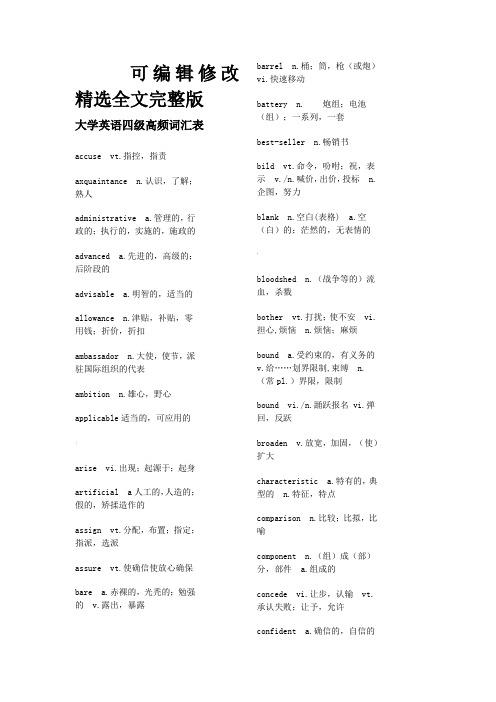
可编辑修改精选全文完整版大学英语四级高频词汇表accuse vt.指控,指责axquaintance n.认识,了解;熟人administrative a.管理的,行政的;执行的,实施的,施政的advanced a.先进的,高级的;后阶段的advisable a.明智的,适当的allowance n.津贴,补贴,零用钱;折价,折扣ambassador n.大使,使节,派驻国际组织的代表ambition n.雄心,野心applicable适当的,可应用的|arise vi.出现;起源于;起身artificial a人工的,人造的;假的,矫揉造作的assign vt.分配,布置;指定;指派,选派assure vt.使确信使放心确保bare a.赤裸的,光秃的;勉强的 v.露出,暴露barrel n.桶;筒,枪(或炮)vi.快速移动battery n. 炮组;电池(组);一系列,一套best-seller n.畅销书bild vt.命令,吩咐;祝,表示 v./n.喊价,出价,投标 n.企图,努力blank n.空白(表格) a.空(白)的;茫然的,无表情的`bloodshed n.(战争等的)流血,杀戮bother vt.打扰;使不安 vi.担心,烦恼 n.烦恼;麻烦bound a.受约束的,有义务的v.给……划界限制,束缚 n.(常pl.)界限,限制bound vi./n.踊跃报名 vi.弹回,反跃broaden v.放宽,加固,(使)扩大characteristic a.特有的,典型的 n.特征,特点comparison n.比较;比拟,比喻component n.(组)成(部)分,部件 a.组成的concede vi.让步,认输 vt.承认失败;让予,允许confident a.确信的,自信的~congratulate vt.祝贺,向……道喜content n.含量;内容(pl/)所含之物; (pl.)目录cooperate vi.合作,协作corresponding a.相应的,符合的,一致的crush vt.压碎,碾碎,弄皱;镇压,压垮deception n.欺骗;诡计,骗局deed n.行为,事迹;契约,证书deliberate v.仔细考虑 a.深思熟虑的;故意的delightful a.令人快乐的,高兴的diplomatic a.外交的;策略的,有手腕的^distinctive a.特殊的,有特色的,区别性的dropout n.中途辍学者;遁世者;(电子设备运作时)短时间信号缺失emit v.散发,发射engagement n.约会;订婚,婚约excellence n.优秀,卓越,[常~s]优点,美德except prep.除……外. Conj.除了;要不是,只是exclaim v.呼喊,惊叫,大声说extension n. 延长扩大;电话分机;伸展fame n.(好)名声,名望,声誉flexibility n.灵活性,机动车辆性,柔韧性>fomer a.以前的,在前的 n.前者fresh a.新(近)的,新到的;新鲜的;(水等)淡的fruitful a.多产的;富有成就的,有作用的frustrate vt.使灰心;失败,阻挠fulfil(l) vt.满足,使满意;履行,实现,完成functional a.为实用而设计的,实用的;正常运转的;有功用的,有用途的grasp vt./n.抓紧;理解,领会guilty a.内疚的;有罪的iceberg n.冰山,浮在海洋上的冰块iedle a.空闲的;无效的 vi.懒散(的),无所事事(的) vt.虚度(光阴)!inquiry n.打听,询问;调查leak v.(使)漏,(使)渗出;泄露,走漏load vt.装(载);大量给予vi.装货 n.装载(量);负荷(量)logo n.(pl. logos)标识lonely a.((人)孤独的,寂寞的;(地方)荒凉的;人迹稀少的loosen vt.解开,放松;松驰mobile a.运动的,可动的;机动的,多变的 n.移动电话modest a.谦虚的;适中的;羞怯的;(女人)正经的negotiate vt.顺利通过.协商,谈判桌,成功越过numerous a.众多的,许多的》obstacle n.障碍(物),妨碍optional a.可以任选的,非强制的overall a.综合的,总体的;全部的确 ad.总的来说 n.长罩衫,(pl.)工装裢owing a.应付的,未付的perceive vt.感觉,感知,理解postpone vt.推迟,延期precaution n.预防,警惕prevail vi.浒盛行;获胜,占优势;说服,劝说,诱使proportion n.比例;部分;均衡,相称propose v.提议,提出;提名,推荐;打算求婚|provided conj.假如,若是pure a.纯洁的,纯净的;抽象的;完全的,十足的ouantity n.量,数量ready a.准备好的;乐意的;快要……的;现在的;迅速的relation n.关系,关联;亲戚render vt.给予,提供;使得,致使;翻译restrain vt.抑制,遏制;阻止,控制rush v.催促;向……猛冲击波n.冲,奔;匆忙;繁忙separate v.((使)分离,(使)分开 a.分离的;个别的skim v.撇(去);掠过,擦过;浏览,略读#spare a.多余的;备用的 vt.省出substitute n.代用品,代替者Vt.代替,代以,替代supreme n.最高的,至上的;最重要的;极度的swallow v./n.吞,咽喉 vt.轻信;忍住,使不流露tame a.驯服的;沉闷的,乏味的 vt.制服;驯化,驯服tear v.撕,扯,撕裂,扯破tender a.温柔的,温和的,仁慈的;疼痛的tense a.拉紧的,绷紧的;紧张的确 v.(使)拉紧,(使)绷紧巴巴 n.(动词的)时态tight a.紧身的,紧贴的;紧的,牢固的;(经费、时间等)紧的确 ad.紧紧地,牢牢地tolerate vt.容忍;容许,承认~trace vt.查出,找到;追溯,探索;描摹 n.痕迹,踪迹;微量,少许track v.跟踪,追踪 n.小路;轨道,跑道;(pl.)足迹,车辙,踪迹trap n.陷阱,圈套 v.诱捕,使落入圈套trick vt./n.欺诈,哄骗 n.戏法;把戏;诀窍vain a.徒劳的,无效的,不成功的;自负的,爱虚荣的vary v.变化,(使)不同,呈差异weaken v.(使),变弱,(使(减弱worthy a.有价值的;可尊敬的,值得……的,配得上的secure a.安全的,可靠的 vt.得到,获得;使安全source n.,源(泉),发源地;来源,出处¥stuff n.原料,材料,东西南北 vt.填满,塞满;让……吃饱symbol n.象征;符号,标志throw n.投,扔,抛urgent a.急迫的,紧要的abstract a./n.抽象(派)的(作品;摘要 vt.写出(书中的)摘要;(使)抽象(化)提取acceptable n.可接受的activity n.活跃,活力;(常pl.)活动adjust vt调节,改变……以适应amuse vt.逗乐,逗笑,给……提供娱乐(或消遣)arouse vt.引起,激起;唤醒.assit n.协助,帮助bargain n.协议,交易;物价商品。
2024年大学英语四级高频词汇表

大学英语四级高频词汇表备注:请同学们自己下载打印,每七天记忆50个单词及他们的例句.为了督促大家打好英语学习的基础―词汇,请大家按时学习,并在任务布置后一周有quiz作为检查,成绩作为平时成绩的一部分.第三周:3月19日---3月25日,词汇1-50ﻫ第四周:3月26日---4月1日词汇51-100ﻫ1.alterv.变化,改动,变更(例)Theseclothesaretoolarge;theymustbealtered.ﻫ这些衣服太大,得修改.ﻫ2.burstvi.,n.忽然发生,爆裂例)Theyburstoutlaughing.他们忽然大笑起来.搭配)abursto flaughter突发的笑声3.disposevi.除掉;处置;处理;处理(of)ﻫ(例)Wehavetodisposeofthispileofoldpapersandmagazines.我们得把这堆旧报纸和杂志处理掉ﻫ(例)Manproposes.Goddisposes.谋事在人,成事在天.4.blastn.爆炸;气流vi.炸,炸掉(例)Theblastfromthebombblewoutallthewindows inthearea.炸弹爆炸的冲击波震破了这个地区的所有窗户.ﻫ(例)They'veblastedawaytherocktobuildthenewroad.ﻫ他们已炸掉这块岩石以便修一条新的路.ﻫ5.consumev.消耗,耗尽ﻫ(例)Hisoldcarconsumedmuchgasoline.他的旧汽车耗油诸多.ﻫ6.splitv.劈开;割裂;分裂a.裂开的ﻫ(例)Wesplitthewoodintolongthinpieces.我们把木头劈成长长的薄片.ﻫ7.spitv.吐(唾液等);唾弃(例)Hespatintotheriver.他把痰吐到河里8.spillv.溢出,溅出,倒出ﻫ(例)Ispiltthecoffee-itspiltallovermybook.ﻫ我洒了咖啡,溅了我一书.ﻫ9.slipv.滑动,滑落;忽视(例)Sheslippedonthewetfloorandfell.她滑倒在湿地板上了.10.slidev.滑动,滑落n.滑动;滑面;幻灯片ﻫ(例)Shefelloverandslidacrosstheshinyfloor.ﻫ她跌倒了,滑过了发亮的地板.ﻫ(例)haveaslideontheice在冰上滑行ﻫ11.bacterian.细菌ﻫ12.breedn.种,品种v.繁殖,产仔ﻫ(例)Theislander sareastrongbreedofpeople.ﻫ这些岛上的居民是一个体格强壮的人.(例)Someanimalswillnotbreedincages.ﻫ有些动物在笼子里不产崽.13.budgetn.预算v.编预算,作安排ﻫ(搭配)agovernmentbudget政府预算(例)Weshouldlearnhowtosavemoneybybudgeting.我们应当通过安排开支而节约钱14.candidaten.候选人(例)Heoffershimselfasacandidateforthechairman.他自荐为主席候选人.ﻫ15.campusn.校园ﻫ(搭配)在校园中oncampus16.liberala.慷慨的;丰富的;自由的ﻫ(例)ﻫ17.transformv.转变,变革;变换(例)Shetransformedtheroombypaintingit.她油漆了房间使它为之一新.18.transmitv.传输,播送;传递(例)TheWorldCupfinalisbeingtransmittedliveto overfiftycountries.世界杯决赛现正向五十多个国家作实况转播.19.transplantv.移植ﻫ(例)Thedoctorsucceededintransplantingakidneyfromonetwintoanother.医生成功地把孪生儿之一的肾脏移植到另一人身上.20.transportvt.运输,运输n.运输,运输工具(例)Thegoodsweretransportedbytrain.货物是用火车运来的.ﻫ21.shiftv.转移;转动;转变(例)Thewindshiftedtothenorth.风转向北吹.ﻫ(例)ShallIshiftthechairs我把椅子移动一下好吗22.varyv.变化,变化;使多样化(例)Theweathervariesfromdaytoday.天气一天天变化.23.vanishvi.消亡,不见(例)Ithoughtitwouldrain,butthecloudshavevanishedandit'safineday.我原以为天要下雨的,可是云消失了,是个好天.24.swallowv.吞下,咽下n.燕子(例)Sheswallowedsomemilk.她咽下几口牛奶.ﻫ25.suspicionn.怀疑,疑心ﻫ(例)Suspicioncreptintohismind.不由得他不产生怀疑.(搭配)abovesuspicion无可置疑ﻫundersuspicion受到怀疑ﻫ26.suspiciousa.怀疑的,可疑的(例)Iamsuspiciousofthatwoman.我很怀疑那位妇女.27.mi lda.温暖的,暖和的;温柔的,味淡的(例)Theweatherismildtoday;itisneitherhotnorcold.今日天气很温暖,不冷也不热.28.tendera.温柔的;脆弱的(例)atendermother慈母atenderexpressiononherfaceﻫ她脸上温柔的表情tenderflowers柔弱的花朵ﻫ29.nuisancen.讨厌(的人或事物)ﻫ(例)Whatanuisance!I'veforgottenmyticket.ﻫ真讨厌,我忘掉带票了.30.insignificanta.无意义的,无足轻重的;无价值的(例)in-无+significant故意义的,意义深长的--〉无关紧要的;无用的31.acceleratevt.加速,促进(例)Nooneknowshowtoacceleratetherateofgrowth.没人懂得怎样提升生长率.ﻫ32.absolutea.绝正确,无条件的;完全的ﻫ(例)Youareanabsolutefool!你是个十足的傻瓜!ﻫ33.boundaryn.分界限,边界ﻫ(例)这道栅栏是我的地和她的地的分界限.34.braken.刹车,制动器v.刹住(车)(例)Hisbrakesfailedonasteephill.他的车闸在陡峭的山坡失灵了.ﻫ35.catalogn.目录(册)v.编目ﻫ(例)Itisthecat alogofallthebooksinthelibrary.这就是图书馆里所有书籍的目录.ﻫ36.vaguea.含糊的,不明确的(例)avagueidea含糊的想法(例)HewasalittlevaguewhenIaskedwhathadhappened.ﻫ我问他出了什么事时,他一无所知.ﻫ37.vainn.徒劳,白费(例)Allourworkwasinvain.我们所有的工作都白费了.ﻫ38.ex tincta.绝灭的,熄灭的ﻫ(例)Someofthespeciesofbirdsareextinct.有几个鸟类已经绝种了.ﻫ39.extraordinarya.不日常的,尤其的,非凡的(例)Whatanextraordinaryidea!多么离奇的想法!40.extremea.极度的,极端的n.极端,过度41.agentn.代理人,代理商;动因,原因(例)Myagenthaspowertosignmyname.我的代理人有权代我签字.(例)Rainandsunaretheagentswhichhelpplantstogrow.ﻫ雨水和太阳是促使植物成长的原因.42.alcoholn.含酒精的饮料,酒精(例)Inevertouchalcohol.我从不饮酒.43.appealn./vi.呼吁,央求ﻫ(例)Thegovernmentisappealingtoeveryonetosavewater.ﻫ政府呼吁每个人节约用水.44.appreciatevt.感激,赏识,观赏(例)Iappreciateyourhelp.我感激你的协助.(例)Doyouappreciategoodwine你会鉴赏好酒吗45.approvev.赞成,同意,同意ﻫ(例)Idon'tapproveofsmoking.我不赞成抽烟.(例)Myparentsdon'tapproveofmesmokingcigarettes.ﻫ我的父母不准许我吸烟.ﻫ46.stimulatevt.刺激,激励ﻫ(例)Praisealwaysstimulateshimtomakegreatereff orts.表扬能激励他愈加努力.ﻫ47.acquirevt.取得,取得;学到(例)SheacquiredaknowledgeoftheEnglishbycareful study.ﻫ她仔细学习而精通英语.ﻫ48.accomplishvt.完成,抵达;实行ﻫ(例)Iaccomplishedtwohours'workbeforedinner.我在吃饭前完成了两小时的工作.ﻫ(例)toaccomplishapurpo se达成目标49.networkn.网状物;广播网,电视网;网络(例)anetworkofrailroads铁路网ﻫ50.tiden.潮汐;时尚(例)Thetideisdown.潮退了.ﻫ(搭配)swim/gowithwiththetide顺应时尚,随波逐流51.tidya.整洁的,整洁的(例)Whatatidyroom!多么整洁的房间呀!ﻫ52.tracevt.追踪,找到n.痕迹,踪迹ﻫ(例)Theytracedthecriminaltoahouseinthecity.ﻫ他们追踪罪犯到了城里的一座房子里.ﻫ(例)Theysearchedthebuildingbutdidnotfindanytraceofthecriminal.他们搜查了这座楼房,可是没有发觉罪犯的一点踪迹.ﻫ53.torturen./vt.拷打,折磨(例)Shediedundertorture.她受严刑拷打致死.ﻫ54.wandervi.漫游,闲逛(例)Thechildrenwanderedinthewoods.孩子们在森林里漫步.55.waxn.蜡(例)Candlesaremadefromwax.蜡烛是蜡做的.56.weavev.织,编(例)Iwoveamat.我编了一张席子.57.preservev.保护,保存,保持,维持(例)TheTownCouncilspentalotofmoneytopreservetheoldcastle.市政委员会花了不少钱来维修那座古城堡.(例)Youcanpreservemeatorfishinsalt.你能够用盐保存肉或鱼.(例)Itisoneofthedutiesofthepolicetopreservepublicorder.警察的职责之一是维持公共秩序.ﻫ61.abusev.滥用,虐待;谩骂ﻫ(例)Hewaschargedofabusingaprivilege.他因滥用特权而被起诉.62.academica.学术的;高等院校的;研究院的(例)Thequestionispurelyacademic.这是一个纯学术性的问题.63.academyn.(高等)专科院校;学会(例)anacademyofmusic音乐学院ﻫ(例)AcademyAward金像奖64.batteryn.电池(组)ﻫ(例)Ourbuswon'tstartbecausethebatteryisflat.我们的大客车发动不起来了,因为电池坏了. 65.barriern.障碍;棚栏ﻫ(例)Thepoliceputabarrieracros stheroad.警察设了路障.66.cargon.(船,飞机等装载的)货ﻫ(例)WesailedfromPerthwithacargoofrawion.我们装着一船生铁从佩思启航.67.careern.生涯,职业(例)Mygrandfatherwasacareerteacher;it'stheonlyjo bhe'deverdone.我祖父教了一辈子书,教书是他所干过的唯一的工作.68.vesseln.船舶;容器,器皿;血管(例)Thereweremanyvesselsintheharbortoday.今日港口有许多船只.ﻫ(例)Apotisavesselforholdingfood.锅是盛食物的器皿.ﻫ69.verticala.垂直的(例)Wallsareusuallyvertical.墙一般是垂直的.70.obligev.迫使,责成;使感激(例)Thepoliceobligedhimtoleave.警方强迫他离开.71.obscurea.阴暗,含糊ﻫ(例)Isthemeaningstillobscuretoyou你以为意思仍然不清楚吗72.extentn.程度,范围,大小,程度(例)Iagreewithyoutosomeextent.我部分地同意你.(例)Whatistheextentofyourgarden你的花园有多大73.exteriorn.外部,外表a.外部的,外表的(例)Painttheexeriorwallsofthehouse.给房子的外墙刷漆.ﻫ74.externala.外部的,外表的,外面的(例)Externalcausesbecomeoperativethroughinter nalcauses.外因通过内因而起作用.ﻫ75.petroln.汽油ﻫ76.petroleumn.石油ﻫ77.delayvt./n.推迟,延误,耽搁ﻫ(例)Theletterwasdelayedthreedaysbythetraina ccident.这次火车事故使这封信耽搁了三天.ﻫ78.decayvi.腐烂,腐朽(例)Sugarcandecaytheteeth.糖能蛀蚀牙.ﻫ79.decenta.像样的,体面的(例)adecenthouse一所像样的房子80.routen.路;路线;航线ﻫ(例)Wecamebyalongerroutethanusual.我们走了一条比一般要长的路来的.81.ruinv.毁坏,破坏n.毁灭,[pl.]废墟(例)Shepouredwaterallovermypainting,andruinedit.她把水全倒在了我的画上,把画毁了.ﻫ(例)Wesawtheruinsofthechurch.我们看见了这座教堂的废墟.ﻫ82.saken.缘故,理由ﻫ(例)Neverdowrongforthesakeofmoney.绝不要为金钱而做坏事.ﻫ(搭配)forthesakeof为了…好处;为…着想,为了…缘故ﻫ83.satelliten.卫星ﻫ(例)Theyreceivetelev isionpicturesbysatellite.他们通过人造卫星接收电视图像.ﻫ84.scalen.大小,规模;等级;刻度ﻫ(例)Theyarepreparingforwaronalargescale.他们正在大规模地备战.ﻫ85.templen.庙宇86.tediousa.乏味道,单调的,ﻫ(例)Theworkistedious.这工作令人厌倦.87.tendvi.易于,趋向ﻫ(例)Peopleunderstresstendtoexpresstheirfullrangeofpotential.处在压力下的人轻易发挥自己所有的潜力.88.tendencyn.趋向,趋势ﻫ(例)Pricescontinuetoshowanupwardtendency.物价呈连续上升趋势.89.ultimatea.最大的,最后的n.极端(例)What'syourultimateobjective你的最后目标是什么ﻫ90.undergov.经历,遭受(例)ﻫ91.abundanta.丰富的,充裕的,大量的(例)Iraqisabundantinpetroleumdeposits.伊拉克石油储量丰富.ﻫ92.adoptv.收养;采取;采纳(例)Theyadoptedourmethods.他们采取了我们的措施.93.adaptvi.适应,适合;改编,改写vt.使适应ﻫ(例)Sheadaptedherselfquicklytothenewclimate.她很快就适应了这种新气候.94.bachelorn.学士,学士学位;单身汉(例)Heremainedabachelorallhislife.他终生未娶.ﻫ(例)AreyouaBachelorofArts你是文学学士吗95.casuala.偶然的,恰巧的;暂时的;非正式的ﻫ(例)96.trapn.陷阱,圈套v.设陷阱捕捉(例)Thepolicesetatraptocatchthethief.警察设下了捉拿窃贼的圈套.ﻫ(例)Theyweretrappedintheburninghotel.他们被困在发生火灾的旅馆里.97.vacanta.空的,未占用的ﻫ(例)Ifthatroomisvacant,weca npracticethere.假如那个房间空着,我们能够在那练习.ﻫ98.vacuumn.真空,真空吸尘器(例)Hiswife'sdeathlefthimavacuuminhislife.他妻子的逝世使他的生活变得空虚.99.orala.口头的,口述的,口的(例)Hewilltakeanoralexamination.他将接收口试.100.opticsn.(单,复数同形)光学ﻫ(例)TheoptictheoryoriginatedwithEinstein.光学理论是爱因斯坦首创的.10ann.器官,风琴(例)Theheartisavitalorgan.心脏是维持生命必须的器官. (例)Heplaystheorganinchurch.他在教堂弹奏风琴.。
英语四级高频词汇word文档汇总版

英语四级高频词汇word文档汇总版一、词汇数量:共45天二、内容以及要求:均为阅读高频词汇。
不用记住拼写,知道单词的汉语意思就行,该word文档不用打印第一天词汇来源:2017年6月份真题(第一套)中的第1篇阅读理解real estate房地产witness[ˈwɪtnɪs]vt. 见证n. 目击者accelerate[ək'seləreɪt]vi。
加速;促进shift[ʃɪft]vi. 转变n. 变化demand[dɪ’mænd]n. 需求vt. 要求characterize[’kærəktə’raɪz]vt. 具有…的特征private[ˈpraɪvɪt]adj. 私人的competitive[kəm’petɪtɪv]adj。
竞争的;有竞争力的around the clock昼夜不停地harmony[’hɑːmənɪ]n. 协调;和睦reluctant[rɪ’lʌkt(ə)nt]adj。
不情愿的afford[ə’fɔːd]vt。
买得起current[’kʌr(ə)nt]adj。
现在的;流通的haunt[hɔːnt]vt. 烦扰suburb['sʌbɝb]n。
郊区hinder[’hɪndə]vt. 阻碍recession[rɪ’seʃ(ə)n]n。
衰退;不景气(经济) invest[ɪn’vest]vt. 投资fierce[fɪəs]adj. 激烈的infrastructure['ɪnfrəstrʌktʃə]n。
基础设施pessimistic[,pesɪ’mɪstɪk]adj。
悲观的cautious['kɔːʃəs]adj. 谨慎的migrate[maɪgreɪt]vi。
移动;移居significant[sɪg’nɪfɪk(ə)nt]adj。
重大的;重要的imitate[’ɪmɪteɪt]vt。
模仿trend[trend]n. 趋势put off推迟retain[rɪ’teɪn]vt. 保持;保留excellent[ˈeksələnt]adj。
英语四级选词填空必考30词,速速收藏
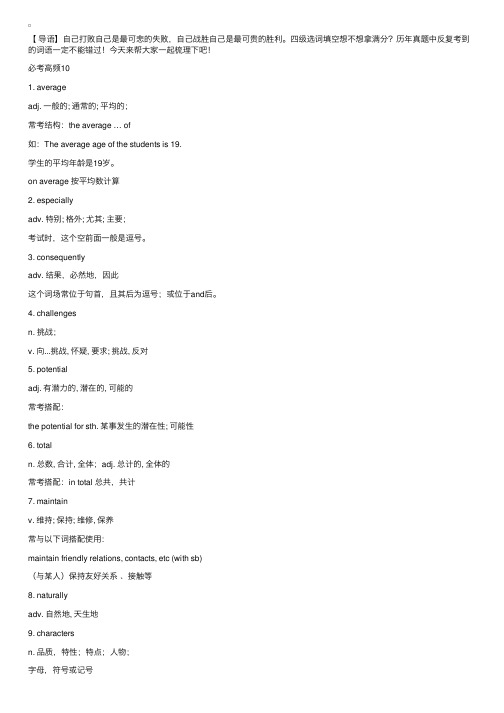
【导语】⾃⼰打败⾃⼰是最可悲的失败,⾃⼰战胜⾃⼰是最可贵的胜利。
四级选词填空想不想拿满分?历年真题中反复考到的词语⼀定不能错过!今天来帮⼤家⼀起梳理下吧!必考⾼频101. averageadj. ⼀般的; 通常的; 平均的;常考结构:the average … of如:The average age of the students is 19.学⽣的平均年龄是19岁。
on average 按平均数计算2. especiallyadv. 特别; 格外; 尤其; 主要;考试时,这个空前⾯⼀般是逗号。
3. consequentlyadv. 结果,必然地,因此这个词场常位于句⾸,且其后为逗号;或位于and后。
4. challengesn. 挑战;v. 向...挑战, 怀疑, 要求; 挑战, 反对5. potentialadj. 有潜⼒的, 潜在的, 可能的常考搭配:the potential for sth. 某事发⽣的潜在性; 可能性6. totaln. 总数, 合计, 全体;adj. 总计的, 全体的常考搭配:in total 总共,共计7. maintainv. 维持; 保持; 维修, 保养常与以下词搭配使⽤:maintain friendly relations, contacts, etc (with sb)(与某⼈)保持友好关系﹑接触等8. naturallyadv. ⾃然地, 天⽣地9. charactersn. 品质,特性;特点;⼈物;字母,符号或记号10. limitedadj. 有限制的, 少的, 有限的常考搭配:(be of) limited use/value:使⽤、价值有限⾼频词语和搭配11. excessn. 过⽕,过头,⽆节制常考搭配:an excess of sth. 过度;过分;过量;过多12. determinev. 确定;决定常考搭配:determine to do sth. 决⼼做某事determine on/upon sth. 决定做;下定决⼼13. including动词原形include,表⽰“包括,包含(某⼈/事物)在内”常考搭配:sth be included in:某物被包含在...⾥14. criticallyadv. 严重地;批判性地;危急地;苛求地跟不同的词搭配,意义不同:critically ill/injured:病、伤得很重critically important:⾮常重要think critically:批判性地思考15. dependentadj. 依赖的, 从属的16. commitmentn. 托付, 交托; 委任,常和to搭配使⽤常考搭配:make a commitment to do sth. 会做某事17. chancesn. 机会, 可能性, 意外常考搭配:chances are是固定搭配,表⽰“可能……(发⽣某事)”18. tendv. 倾向; 趋向(常和to搭配,必背);照管, 照料19. performancen. 履⾏, 成绩, 执⾏;演出, 表演20. enhancev. 提⾼, 增加, 加强阁主的分割线~21. associatedadj. 伙伴的; 合伙的; 共事的; 副的常考搭配:associate常和with连⽤,表⽰把两个⼈或事联系起来;22. rangingv. 范围从……到……;常考搭配:range between A and B/from A to B;在A和B之间变化或变动; 从A延伸到B;23. developv. 发展; 发扬; 发达; 发展; 发育; ⽣长24. contributing动词原形 contribute;常和to搭配,表⽰“捐助; 促成; 帮助”25. impactv./n. 影响常考搭配:impact on/upon sb./ sth.对某⼈[某事物]的强烈的印象或巨⼤的影响26. recessionn. (经济)衰退; 不景⽓常考搭配:the economic/industrial/trade recession经济、⼯业、贸易的衰退或萧条;27. dramaticallyadv. 戏剧性地,引⼈注⽬地28. involvedadj. 有关的,牵扯在内的;涉及到常考搭配:be/get involved in 被牵涉到某个事件或活动中如:More than 30 software firms were involved in the project.超过30多家软件公司与这个项⽬有关。
2018年12月英语四级选词填空必考30词

2018年12月英语四级选词填空必考30词实践证明,单词量越大的同学在阅读理解中看懂的部分就越多,正确率就越高,所以日常备考英语四六级考试的同学们,上考场前一定要备好足够的单词量。
下面是无忧考网四六级频道整理的《2018年12月英语四级选词填空必考30词》一篇文章,希望给同学们的备考有所帮助。
英语四级选词填空必考30词average adj. 一般的; 通常的; 平均的;常考结构:the average …of如:The average age of the students is 19.学生的平均年龄是19岁。
on average 按平均数计算especially adv. 特别; 格外; 尤其; 主要;考试时,这个空前面一般是逗号。
如:Millions of wild flowers colour the valleys, especially in April and May.漫山遍野的野花点缀着山谷,特别是每到四月和五月的时候。
potential adj. 有潜力的, 潜在的, 可能的常考搭配:the potential for sth. 某事发生的潜在性; 可能性total n. 总数, 合计, 全体;adj. 总计的, 全体的, 常考搭配:in total 总共,共计maintain v. 维持; 保持; 维修, 保养常与以下词搭配使用:maintain friendly relations, contacts, etc (with sb) (与某人)保持友好关系﹑接触等必考词语和搭配dependent adj. 依赖的, 从属的常考搭配:dependent on/upon sb./sth. 取决于、依赖某人或某事commitment n. 托付, 交托; 委任,常和to搭配使用常考搭配:make a commitment to do sth. 承诺会做某事chances n. 机会, 可能性, 意外常考搭配:chances are是固定搭配,表示“可能……(发生某事)”tend v. 倾向; 趋向(常和to搭配,必背);照管, 照料performance n. 履行, 成绩, 执行;演出, 表演survive v. 活下来, 幸存如:survive an earthquake:在地震中幸存常考搭配:survive from sth. 继续生存或存在Many strange customs have survived from earlier times. 有许多古怪的习俗源远流长.survive on sth. 继续生存或存在I can t survive on £30 a week.意为It is not enough for my basic needs. 我每周收入30英镑难以活命.fast n./v. 禁食;斋戒;adj. 快速的;adv. 很快地naturally adv. 自然地, 天生地, associated adj. 伙伴的; 合伙的; 共事的; 副的常考搭配:associate常和with连用,表示把两个人或事联系起来;develop v. 发展; 发扬; 发达; 发展; 发育; 生长多义词,和不同的词搭配有不同的意思。
完整word版,英语四级选词填空高频词汇与技巧
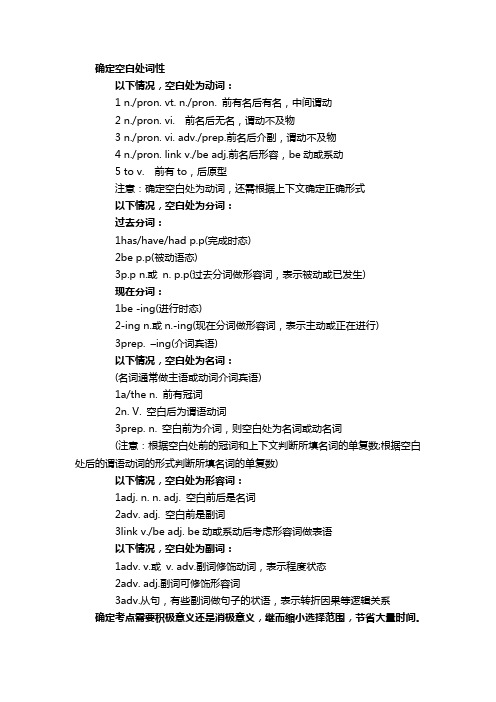
确定空白处词性以下情况,空白处为动词:1 n./pron. vt. n./pron. 前有名后有名,中间谓动2 n./pron. vi. 前名后无名,谓动不及物3 n./pron. vi. adv./prep.前名后介副,谓动不及物4 n./pron. link v./be adj.前名后形容,be动或系动5 to v. 前有to,后原型注意:确定空白处为动词,还需根据上下文确定正确形式以下情况,空白处为分词:过去分词:1has/have/had p.p(完成时态)2be p.p(被动语态)3p.p n.或n. p.p(过去分词做形容词,表示被动或已发生)现在分词:1be -ing(进行时态)2-ing n.或n.-ing(现在分词做形容词,表示主动或正在进行)3prep. –ing(介词宾语)以下情况,空白处为名词:(名词通常做主语或动词介词宾语)1a/the n. 前有冠词2n. V. 空白后为谓语动词3prep. n. 空白前为介词,则空白处为名词或动名词(注意:根据空白处前的冠词和上下文判断所填名词的单复数;根据空白处后的谓语动词的形式判断所填名词的单复数)以下情况,空白处为形容词:1adj. n. n. adj. 空白前后是名词2adv. adj. 空白前是副词3link v./be adj. be动或系动后考虑形容词做表语以下情况,空白处为副词:1adv. v.或v. adv.副词修饰动词,表示程度状态2adv. adj.副词可修饰形容词3adv.从句,有些副词做句子的状语,表示转折因果等逻辑关系确定考点需要积极意义还是消极意义,继而缩小选择范围,节省大量时间。
Sample: The classroom (offers) opportunities for children to replace angry, violent behaviors with _______ , peaceful ones.(根据语法判断此处为形容词,与peaceful有一样具有积极意义,与前文的angry, violent词义色彩相反,那么comprehensive, cooperative, entire应选择cooperative)介词后一定是名词或动名词做宾语.注意to (介词&动词不定式)to的短语接动名词:abandon oneself to(沉溺于),adhere to(坚持),stick to(坚持,信守),cling to(坚持,忠于),admit to(承认),confess to(承认),contribute to(做贡献),feel up to(感觉能胜任),get down to(开始着手做),give one’s mind to(专心),give way to(让步),yield to(屈服),lead to(导致),look forward to(渴望),object to(反对),take to(开始从事,喜欢),turn to(求助),succumb to(屈服),see to(照顾,料理),get used to, be accustomed to, be addicted to, be committed to, be dedicated to, be devoted to, be opposed to, be reduced to, be subject to(受支配的,常遭受),submit to(顺从,屈服)利用不定冠词(a/an)判断考点是否为元音开头,缩小选择范围Sample: Husband and children now do some of these jobs, a ____ that has changed the target market for many products.(scale, potential, gap, extreme, purchase, situation)充分利用词库中的近义词或反义词(若词库中出现一对近义或反义词,其中一个必定是干扰项.反义词考查学生对文章语境色彩的辨析,只要辨析考点单词是积极还是消极意义,就不难排除.近义词考查考生对词汇搭配用法的掌握,需要学生牢记近义词的各种用法及搭配。
背熟这30个高频词,轻松拿下四级选词填空!
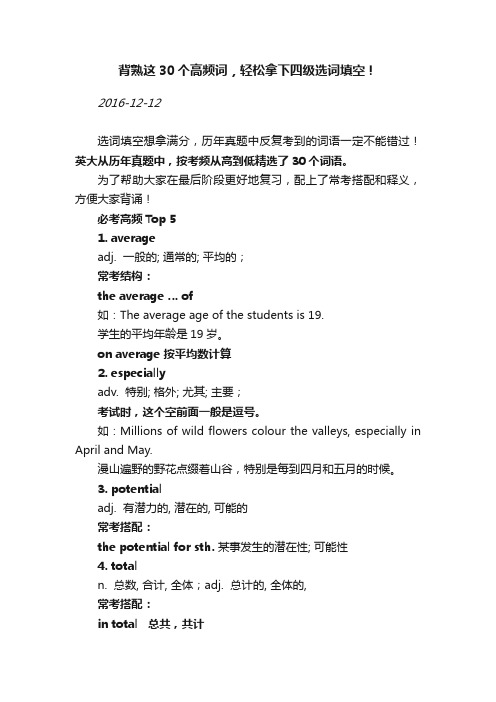
背熟这30个高频词,轻松拿下四级选词填空!2016-12-12选词填空想拿满分,历年真题中反复考到的词语一定不能错过!英大从历年真题中,按考频从高到低精选了30个词语。
为了帮助大家在最后阶段更好地复习,配上了常考搭配和释义,方便大家背诵!必考高频Top 51. averageadj. 一般的; 通常的; 平均的;常考结构:the average … of如:The average age of the students is 19.学生的平均年龄是19岁。
on average 按平均数计算2. especiallyadv. 特别; 格外; 尤其; 主要;考试时,这个空前面一般是逗号。
如:Millions of wild flowers colour the valleys, especially in April and May.漫山遍野的野花点缀着山谷,特别是每到四月和五月的时候。
3. potentialadj. 有潜力的, 潜在的, 可能的常考搭配:the potential for sth. 某事发生的潜在性; 可能性4. totaln. 总数, 合计, 全体;adj. 总计的, 全体的,常考搭配:in total 总共,共计5. maintainv. 维持; 保持; 维修, 保养常与以下词搭配使用:maintain friendly relations, contacts, etc (with sb) (与某人)保持友好关系﹑接触等必考词语和搭配1. dependentadj. 依赖的, 从属的常考搭配:dependent on/upon sb./sth. 取决于、依赖某人或某事2. commitmentn. 托付, 交托; 委任,常和to搭配使用常考搭配:make a commitment to do sth. 承诺会做某事3. chancesn. 机会, 可能性, 意外常考搭配:chances are是固定搭配,表示“可能……(发生某事)”4. tendv. 倾向; 趋向(常和to搭配,必背);照管, 照料5. performancen. 履行, 成绩, 执行;演出, 表演6. survivev. 活下来, 幸存如:survive an earthquake:在地震中幸存常考搭配:survive from sth. 继续生存或存在Many strange customs have survived from earlier times. 有许多古怪的习俗源远流长。
30个常考的英语四级真题高频词汇

1. on purpose(=by intention, deliberately)故意2. in proportion to 与…成比例3. protect…from 阻止..不受,保护不受4. be proud of 为…自豪5. provide for 为…做准备6. in public 公开地, 当众7. prohibit…from (=forbid) 禁止, 阻止8. to the purpose (=useful for one’s purpose)得要领的, 中肯的9. be qualified in 在某种科目或学科上合格bequalified for 在某种职业上合格10. call…in question 对…表示怀疑11. beyond (all) question (=without question) 毫无疑问12. out of the question (=impossible)不可能的13. in question (=under discussion)所谈及的;14. without question 毫无疑问15. be caught in the rain 被雨淋了16. at random (=without aim or purpose) 随便地, 任意地, 胡乱地17. range over (=cove, include) 范围包括18. range between 范围在..与..之间不等19. at any rate (=at all events)无论如何,总之20. beyond the reach of 无法达到(得到,理解)21. out of reach of 无法够到. within reach of (or within one’s reach) 够得到,能拿到22. react to 对…作出反应23. react on upon 对…产生影响24. react against 作出反抗或反对反应25. (be) ready for 准备好做…26. in reality (=in fact, really) 事实上27. beyond all reason 没有道理的28. reason with (=argue) 劝说29. it stands to reason that …理所当然30. by reason of (=because of) 由于,因为。
历年英语四级选词填空高频词汇精选全文完整版
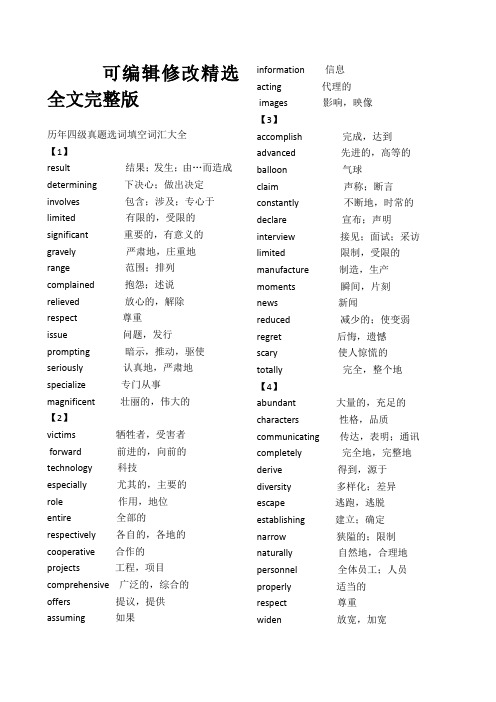
可编辑修改精选全文完整版历年四级真题选词填空词汇大全【1】result 结果;发生;由…而造成determining下决心;做出决定involves 包含;涉及;专心于limited 有限的,受限的significant 重要的,有意义的gravely 严肃地,庄重地range 范围;排列complained 抱怨;述说relieved 放心的,解除respect 尊重issue 问题,发行prompting 暗示,推动,驱使seriously 认真地,严肃地specialize 专门从事magnificent 壮丽的,伟大的【2】victims 牺牲者,受害者forward 前进的,向前的technology 科技especially 尤其的,主要的role 作用,地位entire 全部的respectively 各自的,各地的cooperative 合作的projects 工程,项目comprehensive 广泛的,综合的offers 提议,提供assuming 如果information 信息acting 代理的images 影响,映像【3】accomplish 完成,达到advanced 先进的,高等的balloon 气球claim 声称;断言constantly 不断地,时常的declare 宣布;声明interview 接见;面试;采访limited 限制,受限的manufacture 制造,生产moments 瞬间,片刻news 新闻reduced 减少的;使变弱regret 后悔,遗憾scary 使人惊慌的totally 完全,整个地【4】abundant 大量的,充足的characters 性格,品质communicating 传达,表明;通讯completely 完全地,完整地derive 得到,源于diversity 多样化;差异escape 逃跑,逃脱establishing 建立;确定narrow 狭隘的;限制naturally 自然地,合理地personnel 全体员工;人员properly 适当的respect 尊重widen 放宽,加宽【5】closer 靠近的painful 痛苦的daily 每日performance 履行emotional 表现强烈情感的profession 职业enhance 提高remarkably 引人注目地enormous 巨大的require 要求;需要especially 尤其地;主要地sensitive 敏感的hinder 阻碍urge 催促;推进mission 代表团;使命【6】already 早已,已经analyzed 分析aspects 方面characters 性格,特征contributing 贡献的,起作用的describing 描写;叙述established 建立quality质量quoted 引述引用recording 记录recruited 新兵,新成员,招聘total总计unconscious 失去知觉的【7】accommodations住处clumsy笨拙的;复杂难懂的doubtful 难以预测的exceptions例外expand扩张historic 在历史上重要的、有影响的incredible 不可思议;惊人的powering动力protect 保护reduced 减少的replace 替换;代替sense感觉shifted 改变;转移supplying 供给vast广阔的;浩瀚的【8】abilities 能力,资格extent 程度;长度achieve 取得;获得indicates 表明;象征appeal 上诉,呼吁proceeds 收入,收益;行进complaints 抱怨,委屈psychological 心理上的;精神上的contribution 贡献,捐赠raised 引起;提高;唤起displayed 陈列;显示smart 聪明essentially本质上的standard 标准eventually 终于【9】alert 警觉,警报formally 正式的associated 合作,合伙function 功能;职务attracting吸引mixed 混合的cling 附着于negative 消极的continuing 继续的,连续的sufficient 足够的definitely 明确的;确切的tend倾向different 不同;不平常younger 年纪较小的【10】stable稳定的,沉稳的significant 重要的,有意义的solution 解决;答案role角色progress进步,发展marvelous 引起惊异的;不可思议的included 包括growth 生长exactly 精确地;完全地consist 由…组成comprise 包含;由…组成competitions 竞争combined 结合的;联合challenge 挑战;盘问certainly无疑的,确切地【11】survive幸存的formally 正式的surrounding 环境,周围的financially 财政上,金融上serves服务,招待domestic 家庭的,佣人reviewed 复习competition竞争reported 据报告recession 经济衰减communities 社区;社会团体circling 环骑household 家庭;家庭的accumulate 积累gather 收集【12】appealing 吸引人的occupation职业,工作average平常的;平均的occurring 事件conflict 冲突positions 位置currently当前的primary 首要的elementary 基本的,元素recession 经济衰减ensure 确保regularly 有规律的female 女性的unusual 不平常的fill使充满的【13】adapt适应于prefer 更喜欢;提升available 可用的recommending 推荐;劝告;begin开始species 物种concern 涉及;关心specify指定;明确提出criteria (批评,判断)标准,准则stop 停止;塞往items 项目taking 拿nationwide 全国范围variety 种类的possible 可能【14】conclusive 决定性的contributes 贡献出,捐赠derive 得出,导出expresses 表达;乘快车fixed 固定的immensely 极大地increase 增加maintain 保持;保养mission 代表团participate参加某事particular 特别的;详细的provides提供;规定regions地区,地域surprisingly 惊人的switched 开关【15】accident 意外事件excess事故annually每年impact影响avoided 避开;避免instances 例子;情况caused原因,引起modest 谦虚的considerable 相当大的revised 经过修订的develop开发的slightly轻微地documented备有证明文件的undertake 承担的dramatically 戏剧性地【16】allowing允许maintain保持avoidable 可避免的maximum最大值的briefly 短暂地,简要的prevent 预防的component 成分;零件;组成的principle 原则;原理determined坚定的;决定provoke 激起,挑起helping 帮助seriously 认真严肃increasingly 越来越多地topic 主题;话题lowest最低的【17】average 平均的;平常的including 包括;包含basis基础monitor 显示屏;班长common 普通的reason 理由;原因consequently 所以;因此results 结果;发生detection 侦查shared 共享的developing 发展中的symbols 象征distributed分布式的;分配symptoms 症状dramatically 戏剧性的。
英语四级高频词汇word文档汇总版之欧阳歌谷创编

英语四级高频词汇word文档汇总版欧阳歌谷(2021.02.01)一、词汇数量:共45天二、内容以及要求:均为阅读高频词汇。
不用记住拼写,知道单词的汉语意思就行,该word文档不用打印第一天词汇来源:2017年6月份真题(第一套)中的第1篇阅读理解real estate房地产witness[ˈwɪtnɪs]vt. 见证n. 目击者accelerate[ək'seləreɪt]vi. 加速;促进shift[ʃɪft]vi. 转变n. 变化demand[dɪ'mænd]n. 需求vt. 要求characterize['kærəktə'raɪz]vt. 具有…的特征private[ˈpraɪvɪt]adj. 私人的competitive[kəm'petɪtɪv]adj. 竞争的;有竞争力的around the clock昼夜不停地harmony['hɑːmənɪ]n. 协调;和睦reluctant[rɪ'lʌkt(ə)nt]adj. 不情愿的afford[ə'fɔːd]vt. 买得起current['kʌr(ə)nt]adj. 现在的;流通的haunt[hɔːnt]vt.烦扰suburb['sʌbɝb]n. 郊区hinder['hɪndə]vt. 阻碍recession[rɪ'seʃ(ə)n]n. 衰退;不景气(经济)invest[ɪn'vest]vt. 投资fierce[fɪəs]adj. 激烈的infrastructure['ɪnfrəstrʌktʃə]n. 基础设施pessimistic[,pesɪ'mɪstɪk]adj. 悲观的cautious['kɔːʃəs]adj. 谨慎的migrate[maɪgreɪt]vi. 移动;移居significant[sɪg'nɪfɪk(ə)nt]adj. 重大的;重要的imitate['ɪmɪteɪt]vt. 模仿trend[trend]n. 趋势put off推迟retain[rɪ'teɪn]vt. 保持;保留excellent[ˈeksələnt]adj. 极好的;优秀的expectation[ekspek'teɪʃ(ə)n]n. 预期;期待profitability[,prɑfɪtə'bɪləti]n. 盈利能力;收益性profit['prɒfɪt]n. 利润;利益vi. 获利第二天词汇来源:2017年6月份真题(第一套)中的第2篇阅读理解capacity[kə'pæsɪtɪ]n. 容量;能力limit['lɪmɪt]n. 限度;界限vt. 限制sophisticated[sə'fɪstɪkeɪtɪd]adj. 精密的;复杂的precious['preʃəs]adj. 宝贵的benefit['benɪfɪt]n. 好处vt. 有益于facilitate[fə'sɪlɪteɪt]vt. 促进;帮助;使便利access to接近;有权使用relevant[ˈreləvənt]adj. 相关的prevent[prɪ'vent]vt. 防止;预防emphasis['emfəsɪs]n. 重点emphasize['emfəsaɪz]vt. 强调tend to经常;倾向于contribute to有助于;促成complementary[kɒmplɪ'ment(ə)rɪ]adj. 互补的;补充的rare[reə]adj. 稀有的detail['diːteɪl]n. 细节vt. 详述burden['bɜːd(ə)n]n. 负担complicated ['kɒmplɪkeɪtɪd] adj. 复杂的constitute['kɒnstɪtjuːt] vt. 构成envy['envɪ]n. 嫉妒enlarge[ɪn'lɑrdʒ]vi. 扩大get rid of摆脱organize[ˈɔ:gənaɪz] vt. 组织;整理advantage [əd'væntɪdʒ] n. 优势receive[rɪ'siːv]vt. 收到;接收gradually['grædʒʊəli] adv. 逐渐地interfere[ɪntə'fɪə]vi. 干涉condition[kən'dɪʃ(ə)n] n. 条件;情况appreciate[ə'priːʃɪeɪt] vt. 重视;欣赏sort[sɔrt]vt. 将…分类n. 种类retrieval[rɪ'triːvl]n. 检索mechanism['mek(ə)nɪz(ə)m]n. 机制第三天词汇来源:2017年6月份真题(第二套)中的第1篇阅读理解decrease[dɪ'kriːs]vi. 减少,下降improve[ɪm'pruv]vt. 改善,改进develop[dɪ'veləp]vt. 形成,产生;开发;发展expand[ɪk'spænd]vt. 扩张remain[rɪ'meɪn]vi. 保持;依然;剩余gloomy['gluːmɪ]adj. 黑暗的;沮丧的experience[ɪkˈspɪərɪəns]vt. 经历;n. 经验recover[rɪ'kʌvə]vt. 恢复population[pɒpjʊ'leɪʃ(ə)n]n. 人口promote[prə'məʊt]vt. 促进;推销[brænd]n. 品牌luxurious[lʌɡ'ʒʊrɪəs]adj. 奢侈的particular[pəˈtɪkjʊlə(r)]adj. 特别的;特定的strength[streŋθ]n. 优势;力量recycle[riː'saɪk(ə)l]vi. 重复利用reject[rɪ'dʒekt]vt. 拒绝infer[ɪn'fɜː]vt. 推断protect[prə'tekt]vt. 保护manufacturer[,mænju'fæktʃərɚ]n. 制造商shrink[ʃrʌŋk]vt. 收缩(shrunk是其过去分词) billion['bɪljən]n. 十亿furthermore[,fɝðɚ'mɔr]adv. 此外;而且far fromadv. 远离;完全不rosyadj. 美好的;乐观的leading['lidɪŋ]adj. 主要的indicator['ɪndɪkeɪtə]n. 指标;指示器proportion[prə'pɔːʃ(ə)n]n. 比例;部分alternative[ɔːl'tɜːnətɪv]n. 替代物adj. 可替代的deem[diːm]vt. 认为reflect[rɪ'flekt]vt. 反映;思考typically['tɪpɪkəlɪ]adv.通常regular['regjʊlə]adj. 普通的;定期的;有规律的when it comes to当提到highlight['haɪlaɪt]vt. 突出;强调第四天词汇来源:2017年6月份真题(第二套)中的第2篇阅读理解quit[kwɪt]vt. 放弃;离开;辞职abrupt[ə'brʌpt]adj. 突然的['pæt(ə)n]n. 模式physical['fɪzɪk(ə)l]adj. 身体的train[treɪn]vt. 训练physician[fɪ'zɪʃ(ə)n]n. 医生(内科)encourage[ɪn'kʌrɪdʒ]vt. 鼓励offer['ɒfə]vt. 提供replace[rɪ'pleɪs]vt. 取代,代替experiment[ɪk'sperɪmənt] n. 实验idealized[aɪˈdɪəlaɪzd] adj. 理想化的unexpected[ʌnɪk'spektɪd] adj. 意外的mislead[mɪs'liːd]vt. 误导illustrate['ɪləstreɪt]vt. 阐明accomplish[ə'kʌmplɪʃ]vt. 完成;实现[rɪ'kwaɪə]vt. 需要challenge['tʃælɪndʒ]n. 挑战vt. 质疑withdraw[wɪð'drɔː]vt. 撤退symptom['sɪmptəm]n. [临床] 症状process[prəˈses]n. 过程vt. 处理cut downvt. 削减reduce[rɪ'djuːs]vt. 减少;降低regardless of不管;不顾effective[ɪ'fektɪv]adj. 有效的quote[kwəʊt]vi. 引用specific[spə'sɪfɪk]adj. 特定的;详细的compelling[kəm'pelɪŋ]adj. 令人信服的;引人注目的;强制的compel[kəm'pel]vt. 强迫第五天词汇来源:2017年6月份真题(第三套)中的第1篇阅读理解[freɪz]n. 短语crisis['kraɪsɪs]n. 危机debate[dɪ'beɪt]vt. 争论;讨论acknowledge[ək'nɒlɪdʒ]vt. 承认misrepresent[,mɪsreprɪ'zent]vt. 歪曲represent[reprɪ'zent]vt. 代表;描绘undergo[ʌndə'gəʊ]vt. 经历,经受radical['rædɪk(ə)l]adj. 彻底的;根本的;激进的transformation[trænsfə'meɪʃ(ə)n]n. 转变;转换mature[mə'tʃʊə]vt. 使…成熟adj. 成熟的harvest['hɑːvɪst]vt. 收获meaningful['minɪŋfl]adj. 有意义的narrative['nærətɪv]n. 叙述;故事['krɪtɪk(ə)l]adj. 至关重要的;批评的turning point转折点evidence['evɪd(ə)ns]n. 证据conduct['kɒndʌkt]vt. 进行n.行为decade['dekeɪd]n. 十年the bulk of大多数,大部分pause[pɔːz]vi. 暂停terrify['terɪfaɪ]vt. 使害怕;使恐惧describe[dɪ'skraɪb]vt. 描述precisely[prɪ'saɪslɪ]adv. 恰恰,正是;精确地reap[riːp]vt. 收获leap[liːp]vt. 跳跃venture['ventʃə]n. 风险vi. 冒险descent[dɪ'sent]potential[pəˈtenʃl]adj. 潜在的n. 潜能equip[ɪ'kwɪp]vt. 装备,配备take advantage of利用第六天词汇来源:2017年6月份真题(第三套)中的第2篇阅读理解sign[saɪn]n. 迹象coming['kʌmɪŋ]adj. 即将到来的protein['prəʊtiːn]n. 蛋白质decorate['dekəreɪt]vt. 装饰;装修;布置cherish['tʃerɪʃ]vt. 珍爱contemporary[kən'temp(ə)r(ər)ɪ]adj. 当代的tradition[trə'dɪʃ(ə)n]n. 传统serve as充当unique[juː'niːk]adj. 独特的surface['sɜːfɪs]n. 表面;外观vi. 浮出水面adj. 表面的,肤浅的multiple['mʌltɪpl]adj. 多种的;多样的design[dɪ'zaɪn]vt. 设计derive[dɪ'raɪv]vt. 获得;源于originate[ə'rɪdʒɪneɪt]vt. 起源,发源celebrate['selɪbreɪt]vt. 庆祝honor[ˈɒnə(r)]vt. 尊敬n. 荣誉elevate['elɪveɪt]vt. 提升delicate['delɪkət]adj. 脆弱的;微妙的appeal[ə'piːl]vi. 吸引;上诉;呼吁date back to追溯到incorporate[ɪn'kɔːpəreɪt]vt. 合并incorporate into并入,融入church[tʃɜːtʃ]n.教会;教堂第七天词汇来源:2017年6月份真题(第一套)中的选词填空accuse (n. accusation)[ə'kjuːz]vt.控告,指控actually[ˈæktʃuəli]adv. 实际上;事实上claim[kleɪm]vt. 声称;要求complain[kəm'pleɪn]vt. 抱怨deserve[dɪ'zɜːv]vt. 应受,应得frustrate[frʌ'streɪt]vt. 受挫;使感到灰心launch[lɔːntʃ]vt. 发起,发动investigate[ɪn'vestɪgeɪt]vt. 调查deliver[dɪ'lɪvə]vt. 递送;发表measure['meʒə]vt. 测量;衡量n. 措施promise['prɒmɪs]vt. 承诺commission[kə'mɪʃ(ə)n]n. 委员会;佣金arouse[ə'raʊz]vt. 引起;唤醒giant['dʒaɪənt]adj. 巨大的charge[tʃɑːdʒ]n. 费用vt. 对…收费第八天词汇来源:2017年6月份真题(第二套)中的选词填空control[kən'trəʊl]vt. 控制increase[ɪn'kriːs]vt. 增加involve[ɪn'vɒlv]vt. 涉及be involved in参与到…之中;涉及到…phenomenon[fɪ'nɒmɪnən]n. 现象sensitive['sensɪtɪv]adj. 敏感的solution[sə'luʃən]n. 溶液;解决方案sufficient[səˈfɪʃənt]adj. 足够的;充分的vigorous['vɪg(ə)rəs]adj. 强有力的;精力充沛的turn out结果是;(事实)证明是exhaust[ɪg'zɔːst]vt.耗尽;使精疲力尽muscle['mʌs(ə)l]n. 肌肉stimulate['stɪmjə'let]vt. 刺激;激励fatigue[fə'tiːg]n. 疲劳nervous['nɜːvəs]adj. 神经的;紧张的moderate['mɒd(ə)rət]adj. 适度的;温和的vt. 缓和;减轻dose[dəʊs]n. 剂量(药)visual['vɪʒjʊə]adj. 视觉的,视力的capture['kæptʃə]vt. 捕捉equivalent[ɪ'kwɪv(ə)l(ə)nt]adj. 等同的;相等的reverse[rɪ'vɜːs]vt. 彻底改变;颠倒display[dɪ'spleɪ]vt. 显示;表现第九天词汇来源:2017年6月份真题(第三套)中的选词填空consume[kənˈsum]vt. 消耗;消费direct[daɪˈrekt]adj. 直接的 vi. 指导exclusive[ɪk'sklusɪv]adj. 独有的;排外的inform[ɪn'fɔːm]vt. 通知raw[rɔː]adj. 生的;未加工的relative['relətɪv]adj. 相对的 n. 亲戚resource[rɪ'sɔːs]n. 资源staple['stepl]adj. 主要的flavor['fleɪvə]n. 滋味;风味mention['menʃ(ə)n]vt. 提到ingredient[ɪn'griːdɪənt]n. 成分;要素discover[dɪ'skʌvə]vt. 发现fragment['frægm(ə)nt]n. 碎片ancient[ˈeɪnʃənt]adj. 古代的;古老的examine[ɪg'zæmɪn]vt. 检查;调查majority[mə'dʒɒrɪtɪ]n. 大多数sweet[swiːt]adj. 甜的domesticate[də'mestɪkeɪt]vt. 引进;驯养indicate['ɪndɪkeɪt]vt. 表明;指出region['riːdʒ(ə)n]n. 地区material[mə'tɪərɪəl]n. 材料,原料第十天词汇来源:2017年6月份真题(第一套)中的匹配题readily['redɪlɪ]adv. 愿意地;容易地opportunity[ˌɒpəˈtju:nətɪ]n. 机会conventional[kən'venʃ(ə)n(ə)l]adj. 传统的standard['stændəd]n. 标准typical['tɪpɪk(ə)l]adj. 典型的gain[geɪn]vt. 获得confront[kən'frʌnt]vt. 正视;面对prompt[prɒm(p)t]vt. 促使,促进adj. 迅速的reshape[ˌri:'ʃeɪp]vt. 重塑;改造merit['merɪt]vt. 值得n. 优点immediate[ɪ'miːdɪət]adj. 立即的regard…as把…视为disturb[dɪ'stɜːb]vt. 扰乱;妨碍stable['steɪb(ə)l]adj. 稳定的prospect['prɒspekt]n. 前途explore[ɪk'splɔː]vt. 探索intrude (n. intrusion)[ɪn'truːd]vi. 侵入;闯入recognize['rekəɡnaɪz]vt. 识别,认出signal['sɪgn(ə)l]n. 信号capability[ˌkeɪpəˈbɪləti]n. 能力reinvent[ˌri:ɪnˈvent]vt. 彻底改造;改革incident['ɪnsɪd(ə)nt]n. 事件trigger['trɪgə]vt. 引发,引起threaten['θret(ə)n]vt. 威胁cultivate['kʌltɪveɪt]vt. 培养tremendous[trɪ'mendəs]adj. 极大的,巨大的第十一天词汇来源:2017年6月份真题(第二套)中的匹配题exactly[ɪg'zæk(t)lɪ]adv. 精确地;恰好地decentralize(等于decentralise)[,di:'sentrəlaiz]vt. 分散;分权authority[ɔː'θɒrɪtɪ]n. 权力;权威military['mɪlɪt(ə)rɪ]adj. 军事的manage['mænɪdʒ]vt. 设法(做某事);管理distract[dɪ'strækt]vt. 转移(注意力等);使分心increasing[ɪn'kriːsɪŋ]adj. 越来越(多)的reliable[rɪ'laɪəbl]adj. 可靠的employee[ɪmˈplɔɪi]n. 雇员employer[ɪm'plɒɪə]n. 雇主,老板advisable[əd'vaɪzəb(ə)l]adj. 明智的,可取的flexible (n. flexibility)['fleksɪb(ə)l]adj. 灵活的transition[træn'zɪʃən]n. 过渡;转变executive[ɪgˈzekjʊtɪv]n. 总经理adj. 执行的suggest[sə'dʒest]vt. 表明;建议argue that认为structure['strʌktʃə]n. 结构stage[steɪdʒ]n. 阶段['ɪnsaɪt]n. 洞察力independent[,ɪndɪ'pendənt]adj. 独立的generate['dʒenəreɪt]vt. 产生;形成extraordinary[ɪkˈstrɔ:dnrɪ]adj. 非凡的;特别的count on指望;依靠define[dɪ'faɪn]vt. 定义liberate['lɪbəreɪt]vt. 解放;使自由collaboration[kəlæbə'reɪʃn]n. 合作routinely[rʊ'tinli]adv. 通常地第十二天词汇来源:2017年6月份真题(第三套)中的匹配题ordinary['ɔːdɪn(ə)rɪ]adj. 普通的;平凡的necessarily['nesəs(ə)rɪlɪ]adv. 必要地contact['kɒntækt]vt. 联系;接触due to由于[mæs]n. 大量avoid[ə'vɒɪd]vt. 避免event[ɪ'vent]n. 事件bless[bles]vt. 祝福;保佑seek (sought)[siːk]vt. 试图;寻找reveal[rɪ'viːl]vt. 揭露;显示liable['laɪəbl]adj. 有…倾向的,易…的(和to搭配);有责任的(和for搭配)blur[blɜː]vt. 使…模糊不清fade[feɪd]vi. 褪色;逐渐消失record[ rɪˈkɔrd]vt. 记录neuroscientist[,njʊərəʊ'saɪəntɪst]n. 神经系统科学家recall[rɪ'kɔːl]vt. 回想起;召回subsequent['sʌbsɪkw(ə)nt]adj. 随后的random['rændəm]adj. 随机的;任意的score[skɔː]vi. 得分n. 分数tendency['tend(ə)nsɪ]n. 倾向,趋势imagine[ɪ'mædʒɪn]vt. 想象allow[ə'laʊ]vt. 允许absorb(n. absorption)[əb'zɔːb]vt. 全神贯注;吸收absorb in专心于,专注于complete[kəm'pliːt]adj. 完全的;完整vt. 完成fantasise['fæntəsaiz]vt. 幻想(等于fantasize)interview['ɪntəvjuː]vt. 采访;面试regret[rɪ'gret]n. 遗憾vt. 后悔第十三天词汇来源:2016年12月份真题(第一套)中的选词填空abnormal(反:normal)[æb'nɔːml]adj. 不正常的briefly['briːflɪ]adv. 简短地categorize['kætəgə'raɪz]vt. 分类percentage[pə'sentɪdʒ]n. 百分比prove[pruːv]vt. 证明slight[slaɪt]adj. 轻微的female['fiːmeɪl]adj. 女性的distinguish[dɪ'stɪŋgwɪʃ]vt. 区分;使表现突出gender['dʒendə]n. 性别throughout[θruː'aʊt]prep. 贯穿,遍及range[reɪn(d)ʒ]n. 范围tell[tel]vt.辨别;告诉individual[ˌɪndɪˈvɪdʒʊəl]adj. 个人的n. 个人,个体scan[skæn]vt. 扫描function['fʌŋ(k)ʃ(ə)n]n. 功能vi. 运行play a role in…在……中起作用第十四天词汇来源:2016年12月份真题(第一套)中的匹配题attack[ə'tæk]vt. 攻击equipment[ɪ'kwɪpm(ə)nt]n. 设备similar['sɪmɪlə]adj. 相似的continuous[kən'tɪnjʊəs]adj.持续的;继续的device[dɪ'vaɪs]n. 装置commit[kə'mɪt]vt. 犯罪,做错事crack[kræk]vi. 破裂;破解n. 裂缝transmit[trænzˈmɪt]vt. 传输;传播so as to以便activate['æktɪveɪt]vt. 激活;刺激detect[dɪ'tekt]vt. 察觉;发现criminal['krɪmɪn(ə)l]n. 罪犯bypass['baɪpæs]vt. 绕开track[træk]vt. 跟踪n. 足迹,踪迹statistic[stə'tɪstɪk]n. 统计数据alert[ə'lɜːt]vt. 警告;使警觉comparison[kəm'pærɪsn]n. 比较utilize['juːtəlaɪz]vt. 使用,利用separate[sepəreɪt]vt. 使分离;使分开verify['verɪfaɪ]vt. 核实,证实vary from不同universal[juːnɪ'vɜːs(ə)l]adj. 普遍的;通用的formula['fɔːmjʊlə]n. 公式;方案;配方release[rɪ'liːs]vt. 释放;发布proper['prɒpə]adj. 适当的;合适的;合理的第十五天词汇来源:2016年12月份真题(第一套)中的第1篇阅读理解run[rʌn]vi. 经营;奔跑intend[ɪn'tend]vt. 打算;想要staff[stɑːf]n. 员工considerable[kən'sɪdərəbl]adj. 相当大(多)的industry['ɪndəstrɪ]n. 行业;产业;工业compensate['kɒmpenseɪt]vi. 补偿,赔偿pose[pəʊz]vt. 造成reward[rɪ'wɔːd]n. 报酬;回报vt.奖励preserve[prɪ'zɜːv]vt. 保存;保护realize[ˈrɪəlaɪz]vt. 认识到;实现nature['neɪtʃə]n. 本性;性质;自然calculate['kælkjʊleɪt]vi. 计算rely on依靠,依赖instead of而不是…ban[bæn]vt. 禁止,取缔in favor of支持;赞同wage[weɪdʒ]n. 工资custom['kʌstəm]n. 惯例;风俗virtually[ˈvəːtʃʊəli]adv. 几乎;事实上humanity[hjʊ'mænɪtɪ]n. 人性;人类;人文学科poll[pəʊl]n. 民意调查impact['ɪmpækt]n. 影响第十六天词汇来源:2016年12月份真题(第一套)中的第2篇阅读理解plunge[plʌndʒ]vi. 突然地下降(如价格暴跌);使陷入;使投入expert['ekspɜːt]n. 专家boost[buːst]vt. 促进subject to遭受,经受;服从,受制于commodity[kə'mɒdɪtɪ]n. 商品export[ˈekspɔːrt]vt. 出口suspend[sə'spend]vt. 暂停;悬浮import[ɪm'pɔːt]vt. 进口drastically['dræstikəli]adv. 大幅度地;激烈地reserve[rɪ'zɜːv]n. 储备,储存back up支持parallel['pærəlel]adj. 平行的;类似的cancel['kæns(ə)l]vi. 取消;抵消boom[buːm]n. 繁荣vi. 急速发展existing[ɪɡ'zɪstɪŋ]adj. 目前的;现有的support[sə'pɔːt]vt. 支持economist[ɪ'kɑnəmɪst]n. 经济学家overwhelm[əʊvə'welm]vt. 压倒;淹没sharp[ʃɑːp]adj. 急剧的decline[dɪ'klaɪn]vi. 下降;衰落;谢绝trade[treɪd]n. 贸易;行业trim[trɪm]vi. 削减subsidy['sʌbsɪdɪ]n. 补贴tax[tæks]n. 税第十七天词汇来源:2016年12月份真题(第二套)中的选词填空combine[kəm'baɪn]vt. 结合emission[ɪ'mɪʃ(ə)n]n. 排放indifferent[ɪn'dɪf(ə)r(ə)nt]adj. 漠不关心的voyage['vɒɪɪdʒ]vi. 航行;航海ocean['əʊʃ(ə)n]n. 海洋twice[twaɪs]adv.两倍;两次rate[reɪt]n. 速度;比率;价格take up占据(时间,地方)gather['gæðə]vt. 收集;聚集temperature[temprətʃə(r)]n. 温度collect[kə'lekt]vt. 收集automate['ɔːtəmeɪt]vi. 自动化probe[prəʊb]vi. 探测;调查extensive[ɪk'stensɪv]adj. 广泛的;大量的volcanic[vɒl'kænɪk]adj. 火山的第十八天词汇来源:2016年12月份真题(第二套)中的匹配题overcome[əʊvə'kʌm]vt. 克服achieve[ə'tʃiːv]vt. 获得;实现setback['setbæk]n. 挫折perseverance[pɜːsɪ'vɪər(ə)ns] n. 毅力solve[sɒlv]vt. 解决give up放弃inform[ɪn'fɔːm]vt. 通知;告知strategy[ˈstrætədʒɪ]n. 策略enhance[ɪn'hæns]vt. 提高motivation[məʊtɪ'veɪʃ(ə)n] n. 积极性;动机intelligence [ɪn'telɪdʒ(ə)ns] n. 智力feedback['fiːdbæk]n. 反馈repeat[rɪ'piːt]vt. 重复;背诵conclude[kən'kluːd]vt.作出结论encounter[ɪn'kaʊntɚ]vt. 遭遇;遇到whereas[weər'æz] conj. 然而strive[straɪv]vi. 努力;奋斗resolve[rɪ'zɒlv]vt. 解决;下决心(做某事)characteristic[,kærəktə'rɪstɪk]n. 特征adj. 典型的validate['vælɪdeɪt]vt. 证实,验证monitor['mɒnɪtə]vt. 监控n. 监视器;班长persistence[pə'sɪst(ə)ns]n. 毅力result from由……造成result in导致provide[prə'vaɪd]vt. 提供explicit[ɪk'splɪsɪt]adj. 明确的;清楚的instruction[ɪn'strʌkʃ(ə)n]n. 指导;用法说明despite[dɪ'spaɪt]prep. 尽管第十九天词汇来源:2016年12月份真题(第二套)中的第1篇阅读理解sugar['ʃʊgə]n. 糖alcohol['ælkəhɔl]n. 酒(精)pressure['preʃə]n. 压力budget['bʌdʒɪt]n. 预算cope with处理,应付induce[ɪn'djuːs]vt. 引起,引发overtake[,ovɚ'tek]vt. 超过,赶上work[wɜːk]vi. 起作用n. 工作cooperation[kəʊ,ɒpə'reɪʃ(ə)n] n. 合作firm[fɜːm]adj. 坚定的n. 公司ingredient[ɪn'ɡridɪənt]n. 成分;原料adapt[ə'dæpt]vt. 适应composition[,kɑmpə'zɪʃən]n. 成分;作品single['sɪŋg(ə)l]adj. 唯一的;单一的obesity[o'bisəti]n. 肥胖object['ɒbdʒɪkt]n. 目标vi. 反对extremely[ɪk'strimli]adv. 非常,极其surge[sɜːdʒ]vt. 急剧增加system['sɪstəm]n. 系统by contrast相比之下;与之相比abandon[ə'bænd(ə)n]vt. 放弃satisfy['sætɪsfaɪ]vt. 满足desire[dɪ'zaɪə]n. 欲望vi. 渴望ambitious[æm'bɪʃəs]adj. 有雄心的undertaking['ʌndɚ'tekɪŋ]n. 事业undertake[ʌndə'teɪk]vt. 从事;承担fundamental[fʌndə'ment(ə)l]adj. 基本的n. 基本原则make up组成deal with处理;涉及approach[ə'prəʊtʃ]n. 方法;途径vt. 接近adjust[ə'dʒʌst]vt. 调整portion['pɔrʃən]n. 部分第二十天词汇来源:2016年12月份真题(第二套)中的第2篇阅读理解controversy['kɒntrəvɜːs]n. 争议advocate[ˈædvəkeɪt]vt. 提倡,主张n. 提倡者legislate['ledʒɪsleɪt]vi. 立法;制定法律eliminate[ɪ'lɪmɪneɪt]vt. 消除prohibit[prə'hɪbɪt]vt. 阻止,禁止index['ɪndeks]n. 指标;指数mental['ment(ə)l]adj. 精神的;脑力的numerous['numərəs]adj. 许多的,大量的qualify['kwɒlɪfaɪ]vt. 证明…合格;使具有资格hirevt. 雇用differ from与…不同issue['ɪʃuː]n. 问题vt. 发行,发布regulation[regjʊ'leɪʃ(ə)n]n. 规则regulate['regjʊleɪt]vt. 规定;调节;管理survive[sə'vaɪv]vt. 幸存;生存participate[pɑː'tɪsɪpeɪt]vi. 参加argument['ɑrɡjumənt]n. 观点;论据;争论第二十一天词汇来源:2016年12月份真题(第三套)中的选词填空determine[dɪ'tɜːmɪn]vt. 决定;确定hesitate['hezɪteɪt]vt. 犹豫adequate['ædɪkwət]adj. 充分的;足够的inspire[ɪn'spaɪə]vt. 激励;鼓舞minimal['mɪnɪm(ə)l]adj. 最低的;最小的['ʃeltə]n. 避难所vi. 躲避strengthen['streŋθ(ə)n]vt. 加强;巩固suffer['sʌfə]vt. 遭受suffering['sʌf(ə)rɪŋ]n. 痛苦torture['tɔːtʃə]vt. 折磨punish['pʌnɪʃ]vt. 惩罚match[mætʃ]vt. 匹配offense[ə'fens]n. 犯罪,过错cruel[kruəl]adj. 残忍的victim['vɪktɪm]n. 受害者sentence['sent(ə)ns]vt. 判决,宣判n. 句子convict[kən'vɪkt]vt. 宣告有罪n. 罪犯penalty['pen(ə)ltɪ]n. 处罚;罚款['gaɪdlaɪn]n. 指导方针propose[prə'pəʊz]vt. 建议;打算raise[reɪz]vt. 提高;上升;养育federal['fed(ə)r(ə)l]adj. 联邦的assist[ə'sɪst]vt. 帮助in the first place首先第二十二天词汇来源:2016年12月份真题(第三套)中的匹配题cure[kjʊə]vt. 治疗negative['negətɪv]adj. 消极的identity[aɪ'dentɪtɪ]vt. 辨认;确定practice['præktɪs]vi. 实行;练习n. 实践in some ways在某种程度上application( vt.apply)[ˌæplɪ'keɪʃ(ə)n]n. 应用;申请technology[tek'nɒlədʒɪ]n. 技术['plætfɔːm]n. 平台;站台assign[ə'saɪn]vt. 分配(任务等)other than除了profession[prə'feʃ(ə)n]n. 职业essentially[ɪ'senʃ(ə)lɪ]adv. 本质上degree[dɪ'griː]n. 程度;等级;学位concept['kɒnsept]n. 概念entirely[ɪn'taɪəlɪ]adv. 完全地,彻底地engage[ɪn'geɪdʒ]vt. 吸引;参加;从事spirit['spɪrɪt]n. 精神motivate['məʊtɪveɪt]vt. 刺激;激励previous['priːvɪəs]adj. 以前的widespread[ˈwʌɪdspred]adj. 普遍的consciousadj. 有意识的adventure[əd'ventʃə]n. 冒险digital['dɪdʒɪt(ə)l]adj. 数字的,数码的position[pə'zɪʃ(ə)n]n. 职位;位置magic['mædʒɪk]adj. 不可思议的;有魔力的warn[wɔːn]vt. 警告performance[pə'fɔːm(ə)ns]n. 表现;表演;执行第二十三天词汇来源:2016年12月份真题(第三套)中的第1篇阅读理解tackle['tæk(ə)l]vt. 解决;处理fail to不能administrative[əd'mɪnɪstrətɪv]adj. 行政的;管理的lack[læk]vt. 缺乏fix[fɪks]vt. 修理;使固定imply[ɪm'plaɪ]vt. 暗示[prɪˈzent]adj. 现在的n. 现在vt. 呈现desirable[dɪ'zaɪərəbl]adj. 令人满意的;值得做的be relate to与…有关chief[tʃiːf]adj. 主要的n. 首领affect[ə'fekt]vt. 影响acquire[ə'kwaɪə]vt. 获得persistent[pə'sɪst(ə)nt]adj. 不断的;坚持的share[ʃeə]vt. 分享n. 份额;股份exchange[ɪks'tʃendʒ]n. 交换majority[mə'dʒɒrɪtɪ]n. 大多数curriculum[kə'rɪkjələm]n. 课程so that以便additionally[ə'dɪʃənəlɪ]adv. 此外exclusive[ɪk'skluːsɪv]adj. 排外的,排斥的;独有的automatic['ɔtə'mætɪk]adj. 必然的;自动的craft[krɑːft]n. 工艺;手艺vt. 制作be good at擅长做…第二十四天词汇来源:2016年12月份真题(第三套)中的第2篇阅读理解shed light on阐明curiosity[kjʊərɪ'ɒsɪtɪ]n. 好奇,好奇心intake['ɪnteɪk]n. 摄取量form[fɔːm]n. 形式vi. 形成neither[ˈnaɪðə]adv. 两个都不resist[rɪ'zɪst]vi. 抵抗tempt[tem(p)t]vt. 诱惑interpret[ɪn'tɜːprɪt]vi. 解释;翻译emotion[ɪ'məʊʃ(ə)n]n. 情绪component[kəm'pəʊnənt]quantity['kwɒntɪtɪ]n. 数量overwhelming[,ovɚ'welmɪŋ]adj. 压倒性的;势不可挡的behavior[bɪˈheɪvjə]n. 行为stimulate['stɪmjə'let]vt. 刺激;激励opt[ɒpt]vi. 选择theorize['θɪəraɪz]vi. 推理;建立理论intangible[ɪn'tændʒəbl]adj. 无形的第二十五天词汇来源:2017年12月份真题(第一套)中的完形填空associate[ə'səʊʃɪeɪt]vt. 联系;联合nuisance['njuːs(ə)ns]n. 讨厌的人或事peak[piːk]n. 最高点vt. 达到顶峰prevent[prɪ'vent]vt. 预防;阻止specify['spesɪfaɪ]vt.详细说明[suːˈpɪərɪə]adj. 优秀的suspicious[sə'spɪʃəs]adj. 可疑的;怀疑的obvious['ɒbvɪəs]adj. 明显的creature['kriːtʃə]n. 生物disease[dɪ'ziːz]n. 疾病impressive[ɪm'presɪv]adj. 令人钦佩的;给人深刻印象的accurate[ˈækjərət]adj. 精确的spread[spred]vt. 传播up to多达;直到sample['sæmpl]n. 样本vt. 取样infect[ɪn'fekt]vt. 传染第二十六天词汇来源:2017年12月份真题(第一套)中的匹配题keep up with跟上;和…保持联系ultimate[ˈʌltəmɪt]adj. 最终的discourage[dɪs'kʌrɪdʒ]vt. 阻止;使气馁cheat[tʃiːt]vi. 作弊;欺骗drop out退学;退出issue['ɪʃuː]vt. 发布;发行n. 问题president['prezɪd(ə)nt]n. 总统;董事长;校长well being幸福boundary['baʊnd(ə)rɪ]n. 边界preference['pref(ə)r(ə)ns]n. 偏好access['ækses]vt. 获取;使用n. 进入第二十七天词汇来源:2017年12月份真题(第一套)中的第1篇阅读理解puzzle['pʌz(ə)l]vt. 使…困惑n. 谜extent[ɪk'stent]n. 程度evolution[,iːvə'luːʃ(ə)n]n. 进化;进展circumstance[ˈsɜ:kəmstəns]n. 环境,情况beneficial[benɪ'fɪʃ(ə)l]adj. 有益的recruit[rɪ'kruːt]vt.招聘analyze['ænə,laɪz]vt. 分析(等于analyse)negative['negətɪv]adj.消极的perceive[pə'siːv]vt. 察觉,感觉threat[θret]n. 威胁differ['dɪfə]vi. 相异,不同tolerance['tɑlərəns]n. 容忍;宽容have something to do with 与…有关wonder['wʌndə]vi. 怀疑;想知道to take a closer look进一步研究participant[pɑː'tɪsɪp(ə)nt]n. 参与者technique[tek'niːk]n. 技术curious['kjʊərɪəs]adj. 好奇的surrounding[sə'raʊndɪŋ]adj. 周围的n. 环境work out弄懂;解决hemisphere['hemɪsfɪə]n. 半球keep guard防卫stir[stɜː]vt. 激起第二十八天词汇来源:2017年12月份真题(第一套)中的第2篇阅读理解career[kə'rɪə]n. 职业;事业optimistic[ɒptɪ'mɪstɪk]adj. 乐观的drain[dreɪn]vt. 耗尽;使流出struggle['strʌg(ə)l]vi. 努力;挣扎as a result因此cooperate[kəʊ'ɒpəreɪt]vi. 合作be obliged to不得不,被迫做underestimate[ʌndər'estɪmeɪt]vt. 低估courage。
(完整word版)四级高频词汇
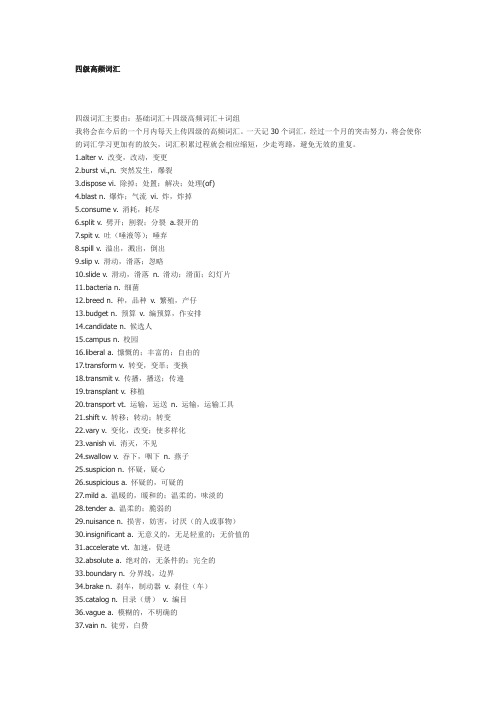
四级高频词汇四级词汇主要由:基础词汇+四级高频词汇+词组我将会在今后的一个月内每天上传四级的高频词汇。
一天记30个词汇,经过一个月的突击努力,将会使你的词汇学习更加有的放矢,词汇积累过程就会相应缩短,少走弯路,避免无效的重复。
1.alter v. 改变,改动,变更2.burst vi.,n. 突然发生,爆裂3.dispose vi. 除掉;处置;解决;处理(of)4.blast n. 爆炸;气流vi. 炸,炸掉5.consume v. 消耗,耗尽6.split v. 劈开;割裂;分裂a.裂开的7.spit v. 吐(唾液等);唾弃8.spill v. 溢出,溅出,倒出9.slip v. 滑动,滑落;忽略10.slide v. 滑动,滑落n. 滑动;滑面;幻灯片11.bacteria n. 细菌12.breed n. 种,品种v. 繁殖,产仔13.budget n. 预算v. 编预算,作安排14.candidate n. 候选人15.campus n. 校园16.liberal a. 慷慨的;丰富的;自由的17.transform v. 转变,变革;变换18.transmit v. 传播,播送;传递19.transplant v. 移植20.transport vt. 运输,运送n. 运输,运输工具21.shift v. 转移;转动;转变22.vary v. 变化,改变;使多样化23.vanish vi. 消灭,不见24.swallow v. 吞下,咽下n. 燕子25.suspicion n. 怀疑,疑心26.suspicious a. 怀疑的,可疑的d a. 温暖的,暖和的;温柔的,味淡的28.tender a. 温柔的;脆弱的29.nuisance n. 损害,妨害,讨厌(的人或事物)30.insignificant a. 无意义的,无足轻重的;无价值的31.accelerate vt. 加速,促进32.absolute a. 绝对的,无条件的;完全的33.boundary n. 分界线,边界34.brake n. 刹车,制动器v. 刹住(车)35.catalog n. 目录(册)v. 编目36.vague a. 模糊的,不明确的37.vain n. 徒劳,白费38.extinct a. 绝灭的,熄灭的39.extraordinary a. 不平常的,特别的,非凡的40.extreme a. 极度的,极端的n. 极端,过分41.agent n. 代理人,代理商;动因,原因42.alcohol n. 含酒精的饮料,酒精43.appeal n./vi. 呼吁,恳求44.appreciate vt. 重视,赏识,欣赏45.approve v. 赞成,同意,批准46.stimulate vt. 刺激,激励47.acquire vt. 取得,获得;学到48.accomplish vt .完成,到达;实行work n. 网状物;广播网,电视网;网络50.tide n. 潮汐;潮流51.tidy a. 整洁的,整齐的52.trace vt. 追踪,找到n. 痕迹,踪迹53.torture n./vt. 拷打,折磨54.wander vi. 漫游,闲逛55.wax n. 蜡56.weave v. 织,编57.preserve v. 保护,保存,保持,维持61. abuse v. 滥用,虐待;谩骂62. academic a. 学术的;高等院校的;研究院的63. academy n. (高等)专科院校;学会64. battery n. 电池(组)65. barrier n. 障碍;棚栏66. cargo n. (船、飞机等装载的)货物67. career n. 生涯,职业68. vessel n. 船舶;容器,器皿;血管69. vertical a. 垂直的70. oblige v. 迫使,责成;使感激71. obscure a. 阴暗,模糊72. extent n. 程度,范围,大小,限度73. exterior n. 外部,外表a. 外部的,外表的74. external a. 外部的,外表的,外面的75. petrol n. 汽油76. petroleum n. 石油77. delay vt./n. 推迟,延误,耽搁78. decay vi. 腐烂,腐朽79. decent a. 像样的,体面的80. route n. 路;路线;航线81. ruin v. 毁坏,破坏n. 毁灭,[pl.]废墟82. sake n. 缘故,理由83. satellite n. 卫星84. scale n. 大小,规模;等级;刻度85. temple n. 庙宇86. tedious a. 乏味道,单调的,87. tend vi.易于,趋向88. tendency n.趋向,趋势89. ultimate a. 极端的,最大的,最终的n. 极端90. undergo v. 经历,遭受91. abundant a. 丰富的,充裕的,大量的92. adopt v. 收养;采用;采纳93. adapt vi. 适应,适合;改编,改写vt. 使适应94. bachelor n. 学士,学士学位;单身汉95. casual a. 偶然的,碰巧的;临时的;非正式的96. trap n. 陷阱,圈套v. 设陷阱捕捉97. vacant a. 空的,未占用的98. vacuum n. 真空,真空吸尘器99. oral a. 口头的,口述的,口的100. optics n. (单、复数同形)光学101. organ n. 器官,风琴102. excess n. 过分,过量,过剩103. expel v. 驱逐,开除,赶出104. expend v. 消费105. expenditure n. 支出,消费;经费106. expense n. 开销,费用107. expensive a. 花钱多的;价格高贵的108. expand v. 扩大,扩张;展开,膨胀109. expansion n. 扩大,扩充;发展,膨胀110. private a. 私人的,个人的111. individual a. 个别的,单独的n. 个人,个体112. personal a. 个人的,私人的;亲自的114. personnel n. [总称]人员,员工;人事部门115. the Pacific Ocean 太平洋116. the Atlantic Ocean 大西洋117. the Arctic Ocean 北冰洋118. the Antarctic Ocean 南冰洋119. grant vt. 授予,同意,准予119. grand a. 宏伟大,壮丽的,重大的120. invade v. 侵入,侵略,侵袭121. acid n. 酸,酸性物质a. 酸的;尖刻的122. acknowledge v. 承认;致谢123. balcony n. 阳台124. calculate vt. 计算,核算125. calendar n. 日历,月历126. optimistic a. 乐观127. optional a. 可以任选的,非强制的128. outstanding a. 杰出的,突出的,显著的129. export n. 出口(物)v. 出口,输出130. import n. 进口(物)v. 进口,输入131. impose vt. 把...加强(on);采用,利用132. religion n. 宗教,宗教信仰133. religious a. 宗教的134. victim n. 牺牲品,受害者135. video n. 电视,视频a. 电视的,录像的136. videotape n. 录像磁带v. 把...录在录像带上137. offend v. 冒犯,触犯138. bother v. 打搅,麻烦139. interfere v. 干涉,干扰,妨碍140. internal a. 内部的,国内的141. beforehand ad. 预先,事先142. racial a. 人种的种族的143. radiation n. 放射物,辐射144. radical a.根本的;激进的145. range n. 幅度,范围v. (在某范围内)变动146. wonder n. 惊奇,奇迹v. 想知道,对...感到疑惑147. isolate vt. 使隔离,使孤立148. issue n. 问题,争论点;发行,(报刊)一期149. hollow a. 空的,中空的,空虚道150. hook n. 钩vt. 钩住151. adequate a. 适当地;足够152. adhere vi. 粘附,附着;遵守,坚持153. ban vt. 取缔,禁止154. capture vt. 俘虏,捕获155. valid a. 有效的,有根据的;正当的156. valley n. 山谷,峡谷157. consistent a. 坚固定;一致的,始终如一的158. continuous a. 继续的,连续(不断)的159. continual a. 不断地,频繁的160. explode v. 爆炸;爆发;激增161. exploit v. 剥削;利用,开采162. explore v. 勘探163. explosion n. 爆炸;爆发;激增164. explosive a. 爆炸的;极易引起争论的165. remote a. 遥远的,偏僻的166. removal n. 除去,消除167. render vt. 使得,致使167. render 解释比较长,可要仔细体会啊!1. render sth(for sth) ;rendersth (to sb) give sth in return,or exchange,or as sth which is due 给予某物作为报偿或用以交换;回报;归还render homage,obedience,allegiance,etc.表示敬意、顺从、效忠等:a reward for services rendered 服务的酬金render good for evil 以德报怨render insult for insult 以侮辱对侮辱render sb a service/render a service to sb 为某人服务render help to disaster victims 向灾民提供援助render thanks to God 感谢上帝2. present or send in (an account)for payment 递交或开出(帐单):account rendered $50 开出50美元的帐单3. cause (sb/sth) to be in a certain condition 使(某人[某事物])处于某种状况:rendered helpless by an accident 因出事故而束手无策Your action had rendered our contract invalid.你们的这种做法导致双方的合同失败。
(完整word版)四级500高频词汇

A1.abandon vt 放弃、遗弃n. 狂热、放任2.abstract adj 抽象的3.abundant adj 大量的,充足的4.access n. 接近;进入;通路have/get access to 接近5.accommodation n 住宿;铺位;调节,调解6.accompany vt. 伴奏、陪伴7.accomplish vt 完成,履行8.account v. 说明、占、解决、得分~for9.accumulate v. 积聚、堆积10.accurate adj. 正确的,精确的11.achieve vt 完成,达到12.acquaint v. 使认识,使了解be ~ ed with acquaintance n.相识、熟人13.acquire vt. 获得、学到14.adapt v 使适应、编写、改写15.adaptable adj 可适应的、可通融的、可改编的16.adjust vt 调整,校正;改变…以适应17.adopt vt. 采用,收养18.advance v提高,推进;预付;n 预付,提早do sth in ~ advanced adj 先进的;高级的19.affair n.事件、事务、私事、恋爱事件20.afford vt.提供,给予,共得起21.alarming adj 惊人的22.alter v 改变、改建、改作23.amaze vt. 使吃惊amazing adj 令人惊讶的amazed adj 感到惊讶的24.ambitious adj. 有雄心的、野心勃勃25.amid prep 在…中,在…里26.amuse vt. 使发笑,使愉快的amusing adj 有趣的amusement n 娱乐,消遣27.anxiety n. 焦急、忧虑、渴望、热望anxious adj28.appeal vi呼吁;有吸引力~ to n 吸引力;呼吁29.apply v 运用、申请、应用30.appreciate vt 感激;欣赏31.arrangement n安排32.arrange vt安排、筹备、整理、计划33.arouse vt 引起,唤起34.artificially adv.人工的35.assemble v 聚集、集合、会集36.assess vt 估价;征收37.asset n 财产;资产(assets)38.assist v.援助,帮助39.associate vt. 使发生联系、使联合vi. 交往结交n.合作人adj. 副的40.assume v 把……视为当然,以为;假定为……41.assured adj 确实的,确定的42.attach vt.缚上,系上,贴上vi.(~to)配属,隶属于43.attend vt出席;照料、注意attention n 注意、专心、关照、考虑44.attribute n. 属性、品质、特征vt. 加于、归结于be ~ed to45.automatically adv.自动地46.available adj 可用的,可得的;通用的47.average n 平均on ~ 平均地48.aware adj 知道的,意识到的be ~ ofB49.bare adj.赤裸的,无遮蔽的,空的vt. 使赤裸、露出50.barrier n. 栅栏;屏障;海关关卡;障碍物51.bargain v 争论价钱、订约、协议n. 特价商品52.behave v 表现;运转;作出反应53.benefit n 利益、津贴get ~ from v 有益于、得益~ from54.blank adj. 空白的,空着的,失色的。
大学英语四级高频词汇表(带例句及固定搭配)

大学英语四级高频词汇表(带例句及固定搭配)大学英语四级高频词汇表1.alter v.改变,改动,变更(例) These clothes are too large; they must be altered.这些衣服太大,得修改。
2.burst vi.,n.突然发生,爆裂(例)They XXX.他们突然大笑起来。
(搭配)a XXX突发的笑声3.dispose vi.除掉;处置;解决;处理(of)(例)We have to dispose of this pile of old papers and magazines.我们得把这堆旧报纸和杂志处理掉(例)Man XXX谋事在人,成事在天。
4.blast n.爆炸;气流vi.炸,炸掉(例)The blast from the bomb blew out all the windows in the area.炸弹爆炸的冲击波震破了这个地区的所有窗户。
(例)They've blasted away the rock to build the new road.他们已炸掉这块岩石以便修一条新的路。
5.consume v.消耗,耗尽(例)His old car XXX.他的旧汽车耗油很多。
6.split v.劈开;盘据;盘据a.裂开的(例)We split the wood into long XXX pieces.我们把木头劈成长长的薄片。
7.spit v.吐(唾液等);唾弃(例)XXX XXX.他把痰吐到河里8.spill v.溢出,溅出,倒出(例)I spilt the coffee-it spilt all over my book.我洒了咖啡,溅了我一书。
9.slip v.滑动,滑落;忽略(例)XXX.她滑倒在湿地板上了。
10.slide v.滑动,滑落n.滑动;滑面;幻灯片(例)XXX.她跌倒了,滑过了发亮的地板。
(例)have a slide on the ice在冰上滑行11.bacteria n.细菌12.breed n.种,品种v.繁殖,产仔(例)The islanders are a strong breed of people.这些岛上的居民是一种体格强壮的人。
6月大学英语四级写作必备30词

1) 大多数人most people→the majority of the population2) 经常often→frequently3) 我相信I believe→from my standpoint, from my perspective4) 必须must→it is a must for us to…5) 知道know→be aware of6) 因为because→in that7) 最后at last→eventually8) 然而but→however9) 如果if→provided that10) 各行各业的人all kinds of people→people from all walks of life11) 引起,导致lead to→contribute to12) 人people→individuals13) 好的good→desirable, beneficial14) 坏的bad→undesirable15) 很多many→numerous16) 越来越more and more→a(n) increasing/mounting number of17) 很very→extremely18) 方面side→aspects19) 表明show→demonstrate, indicate20) 利用use→utilize21) 因此/结果so→therefore22) 部分part→proportion23) 提高improve→enhance24) 改变change→transform25) 强调/重视emphasize→attach great importance to26) 培养develop→cultivate27) 破坏destroy→undermine28) 解决deal with →tackle /figure out29) 普遍的everywhere→universal30) 明显的obvious→apparent31) 在当今社会in the modern society→in the current society32) 使make→enable英语四级作文模板分类记:讨论观点类模版1Different people have different views on_____.Some people think that_____,whereas others aegue that __________.As far as I am concerned, I agree with the opinion that ___________.For one thing,I firmly believe that ___________.For another,_____________.Just think of________,who/which_______.Taking all these factors into consideration,we may safely come to the conclusion that______.Only if_______can we _______,just as the saying goes,________________.模版2In recent years there have been many reports of ________.It turns a new chapter of _________in China,and will have far-reaching effects in the forthcoming years.The biggest benefit,in my eyes,is that_______.In addition,_______.Finally,______________.Apart from the benefits mentioned above,we should also face several unavoidable challenges.In the first place,_____________.In the second place,________.What’s more,_______________.In summary,we should_______________.。
- 1、下载文档前请自行甄别文档内容的完整性,平台不提供额外的编辑、内容补充、找答案等附加服务。
- 2、"仅部分预览"的文档,不可在线预览部分如存在完整性等问题,可反馈申请退款(可完整预览的文档不适用该条件!)。
- 3、如文档侵犯您的权益,请联系客服反馈,我们会尽快为您处理(人工客服工作时间:9:00-18:30)。
高频词汇1. competition n. 竞争,比赛2. exception n. 例外,除外3. issue n. 问题/ v. 发行,发布4. phenomenon n. 现象,事件5. recession n. 经济衰退,不景气6. resource n. 资源,物力7. result n. 结果/ v. 产生8. survey n. / v. 调查9. variety n. 多样,种类10. worth n. 财富,价值/ adj. 值得的11. adapt v. 适应12. analyze v. 分析13. cause n. 原因,理由/ v. 成为……的原因,导致14. determine v. 决定,确定15. invest v. 投资,花费16. involve v. 包含,牵涉17. maintain v. 保持,保养18. range v. 把……分类,范围从(与from连用)19. reduce v. 减少,缩小20. specialize v. 专门从事,专攻(与in连用)21. available adj. 可获得的,有空的22. average adj. 平常的,平均的/ n. 平均水平23. domestic adj. 家庭的,国内的24. excessive adj. 过度的,极度的25. particular adj. 特别的,详细的26. suitable adj. 合适的,适当的27. total adj. 总计的(金额等)/ n. 总计,总数28. especially adv. 尤29. really adv. 真,真正30. increasingly adv. 越来越多地1. similar:相似的;particular:特别的2. equal:平等的;inequality:不平等3. appropriate:恰当的4. competitive:竞争的5. in comparison with:与……相比6. by means of:用……方法7. be accustomed to:习惯于8. in short :简言之9. out of:处于;run out of:用完;go out of:离开10. associate with:与……相关联2015年6月英语四级听力真题:试卷一短对话Short conversations1.W: I’m goin g to give up playing chess. I lost again today.M: Just because you lost? Is that any reason to quit?Q: What does the man imply?2.M: Do you know Sally’s new address? She’s got some mail here, and I’d like to forward it to her. W: Well, we’ve not been in touch for quite a while. Let’s see. Mary should know it.Q: What does the woman mean?3.W: I missed classes this morning. Could you please lend me your notes?M: My notes? You’ve never see my handwriting, have you?Q: What does the man imply?4.M: I’m t aking my girlfriend to the fancy new restaurant for her birthday tonight.W: I went there last weekend, I found it rather disappointing.Q: What does the woman mean?5.W: Winter is over at last. Time to put away my gloves and boots.M: I’ve been waiting f or this for months.Q: What does the man mean?6.W: Thank you for bringing the books back.M: I thought you need them over the weekend. Many thanks for letting me use them.Q: What do we learn from the conversation?7.W: Are you working flexible hours?M: No, I’m not. The weather today is so nice, so I decided to walk to work, and that meant I had to leave an hour earlier than usual.Q: What did the man decided to do?8.W: Our plane has been circling for a long time. Why the delay?M: The airport is closed for a while this morning, and things are still not back to normal.Q: What does the man mean?Long conversation长对话二Man: Miss Yamada, did you ever think that you would find yourself living and working in the western world?Woman: No, not really, although I’ve always listened to recordings of great orchestras from Europe.Man: So you enjoyed classical music even when you were very young?Woman: Oh, yes. I was an only child.Man: You were born in 1955, is that right?Woman: Yes, I began violin lessons at school when I was 6.Man: As young as that, did you like it?Woman: Oh, yes, very much.Man: When did you first play on your own? I mean, when did you give your first performance? Woman: I think I was 8…? No, Nine. I just had my birthday a week before, and my father had bought me a new violin. I played a small piece at the school concert.Man: Did you know then that you would become a professional violinist?Woman: Yes, I think so. I enjoy playing the violin very much, and I didn’t mind practicing, sometimes three or four hours a day.Man: And when did you first come to Europe?Woman: I was very lucky. When I was fifteen, I won a scholarship to a college in Paris. That was for a three-year course.Man: How did your parents feel about that?Woman: I think they were pleased and worried at the same time. It was the chance of a lifetime. But of course I would be thousands of miles from home. Anyway, I studied in Paris for three years and then went back to Tokyo.13. What do we know about the woman before she went to Europe?14. What does the woman say about her music experience?15. What does the woman say about her study in Paris?Spot DictationLooking at the basic biology systems, the world is not doing very well. Yet economic indicators show the world is prospering. Despite a slow start at the beginning of the eighties, global economic output increased by more than a fifth during the decade. The economy grew, trade increased, and millions of new jobs were created. How can biological indicators show the opposite of economic indicators?The answer is that the economic indicators have a basic fault: they show no difference between resources uses that sustain progress and those uses that will hurt it. The main measure of economic progress is the gross national product (GNP). In simple terms, this totals the value of all goods and services produced and subtracts loss in value of factories and equipment. Developed a half-century ago, GNP helped establish a common way among countries of measuring change in economic output. For some time, this seemed to work reasonably well, but serious weakness are now appearing. As indicated earlier, GNP includes loss in value of factories and equipment, but it does not take into account the loss of natural resources, including nonrenewable resources such as oil or renewable resources such as forests.This basic fault can produce a misleading sense of national economic health. According to GNP, for example, countries that overcut forest actually do better than those that preserve their forest. The trees cut down are counted as income but no subtraction is made for using up the forests.Passage One (预测阅读话题:互联网时代受争议的热点)California has a new program called the Digital Textbook Initiative. "Starting this fall with high school math and science, we will be the first state in the nation to provide schools with astate-approved list of digital textbooks." That was Governor in June, talking about his effort to get schools to use materials available free online. He listed reasons why he thinks digital textbooks make sense.California approves traditional textbooks in six-year cycles. Digital ones can offer the latest information. They lighten the load of school bags. They save paper and trees, and make learning more fun and interactive. And above all, he said, they help schools with their finances.The state has had to make severe cuts in school spending because of deep financial problems. More than six million students attend California public schools.Earlier this year, California invited content developers to offer digital math and science materials for high schools. These had to meet at least 90% of the state's learning requirements. Specially trained teachers examined 16 textbooks and approved ten of them.Six of the ten were published by the CK 12 Foundation, a non-profit group that had been developing digital science and math books for about two years. The foundation paid teachers and other education professionals to write and edit them. The money came from a group financed by the Khosla Family.California cannot require schools to use the digital textbooks. Individual school districts will have to decide for themselves.Susan Martimo, a California Department of Education official, says she does not expect widespread use right away. Her best guess is that some schools with a lot of technology will be the first to use them, but only in addition to their traditional books.School administrators point out that the texts may be free online, but students need a way to access them. Not everyone has a computer or electronic reader. Schools could print out copies, but that would not help the environment. Also, there is the cost to train teachers to use digital textbooks effectively.1. We learn from the passage that the Digital Textbook Initiative _______.[A] will probably take effect in six years[B] covers all the high school subjects[C] has been approved by all states[D] is advocated by California state governor2. The main reason for promoting digital textbooks is to _______.[A] help schools save money[B] benefit the environment[C] provide interesting materials[D] reduce students' heavy burden3. What does the author say about CK 12 Foundation?[A] It approved and produced 16 digital textbooks.[B] It paid teachers to write digital textbooks.[C] It is financed by California state government.[D] It makes money through developing digital textbooks.4. According to Susan Martimo, digital textbooks _______.[A] are not likely to have a widespread use[B] will soon replace traditional ones[C] will first be adopted by well-equipped schools[D] are certain to be approved by school districts5. What can be inferred from the last paragraph?[A] Schools are reluctant to print out copies.[B] The use of digital textbooks is not really free.[C] Students need to pay for computers.[D] Training teachers to use the textbooks is not efficient.1.答案:D解析:本题为推断题。
